-
2021-05-14
The first trip I took after COVID-19 travel restrictions was to Seattle. My mother, a nurse, planned the trip; she needed the escape after the trauma of working in healthcare during these times. She disguised it as a trip for my brother's birthday. She packed our bags full of hand sanitizers and masks, even though the trip lasted only three days. We planned to wear masks any time we were in public even if it was no longer required. Any pictures we have from the trip feature a mask either hanging from a wrist or our ears.
Before the pandemic, my family loved traveling, and I studied out of state for my bachelor’s degree. We took at least two small trips a year. If you had asked me about my favorite sight in 2018, I would have told you it was the lights of LA when you fly into LAX, the airport closest to home. For that reason, I called the window seat on every trip. On our first trip after the pandemic, I asked for an aisle seat because it felt less claustrophobic.
The airline required us to skip a seat between each person in an attempt to maintain social distancing. They also required that we wear masks at all times. For the first time, my brother got the window seat instead of the middle seat, which we were told to leave empty. He took this opportunity to spread out more than usual. My mother earned the task of keeping a mask on my five-year-old sister, who hated them. As expected, the flight was significantly emptier due to the need to skip seats.
In Seatle, we stayed in an Airbnb and used Uber to go to the places we wanted to see. I did not have a point of reference for normal crowd sizes at the time, but I remember there being enough people that I was uncomfortable. Often they kept a good distance from me but I still felt anxious about it all. I voted no on the trip from the start and spent our time in Seattle leading the family to less crowded areas. However, I realize now that the places we visited then were underpopulated at the time.
We returned to LAX as planned after the short trip without anyone acquiring any symptoms. My mother still made us all take a covid test upon returning home. With that success, she had our next trips lined up for us as though nothing changed. Slowly, I grew more comfortable with traveling but I still can not stand crowds or enclosed places with people
-
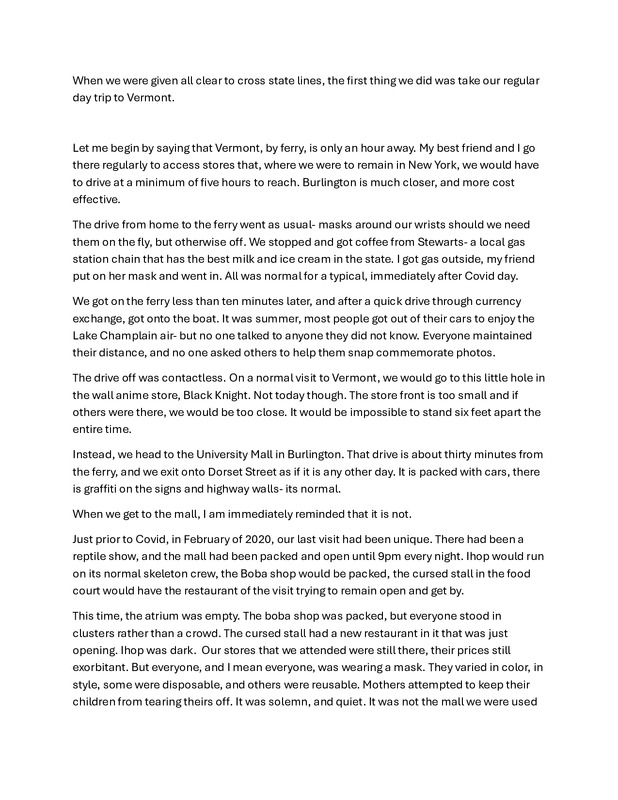
2020-02-01
After travel restrictions were rescinded, two friends took their normal day trip to Burlington, Vermont on a Saturday. They encountered all their regular haunts, with some mild alterations due to the COVID-19 Pandemic as it was winding down.
-
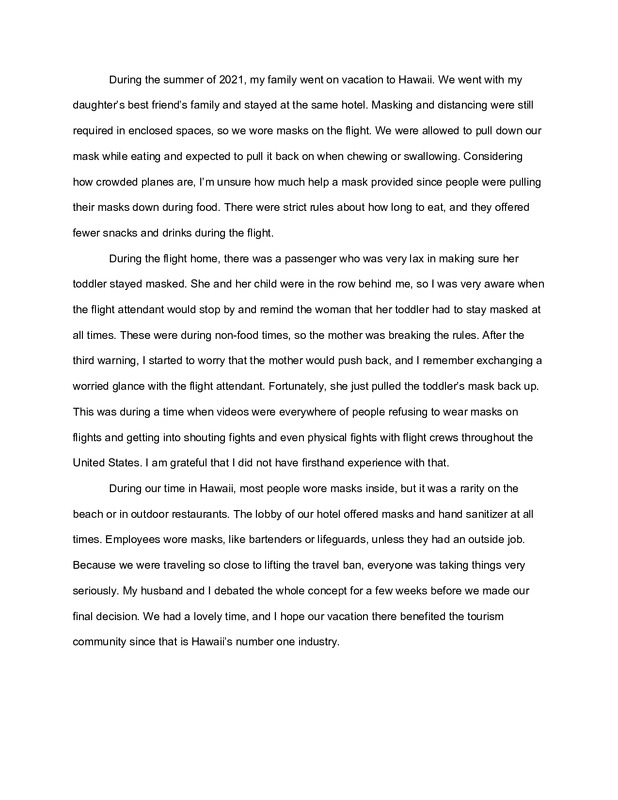
2022-07-01
Traveling to Hawaii in 2022 after travel restrictions were lifted.
-
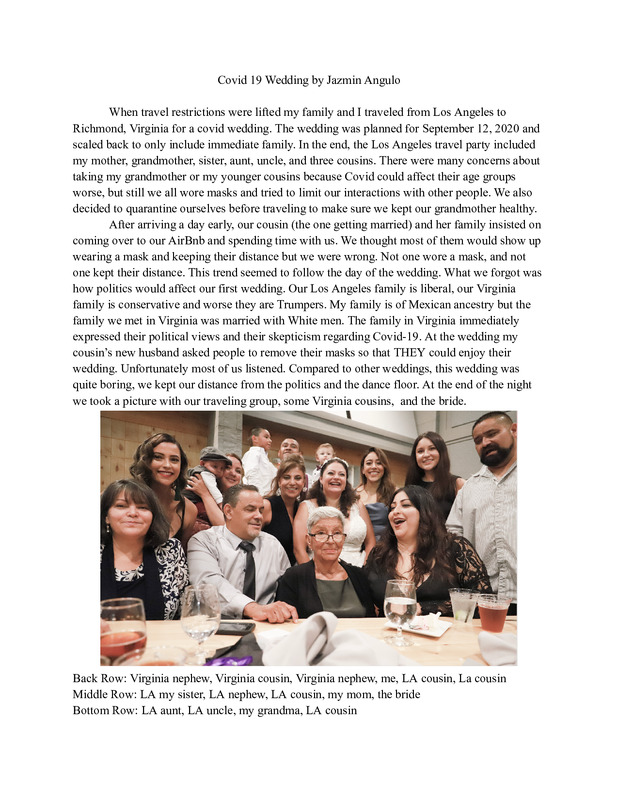
2020-09-12
When travel restrictions were lifted my family and I traveled from Los Angeles to
Richmond, Virginia for a covid wedding. The wedding was planned for September 12, 2020 and scaled back to only include immediate family. In the end, the Los Angeles travel party included my mother, grandmother, sister, aunt, uncle, and three cousins. There were many concerns about
taking my grandmother or my younger cousins because Covid could affect their age groups worse, but still we all wore masks and tried to limit our interactions with other people. We also decided to quarantine ourselves before traveling to make sure we kept our grandmother healthy. After arriving a day early, our cousin (the one getting married) and her family insisted on coming over to our AirBnb and spending time with us. We thought most of them would show up
wearing a mask and keeping their distance but we were wrong. Not one wore a mask, and not one kept their distance. This trend seemed to follow the day of the wedding. What we forgot was how politics would affect our first wedding. Our Los Angeles family is liberal, our Virginia family is conservative and worse they are Trumpers. My family is of Mexican ancestry but the family we met in Virginia was married with White men. The family in Virginia immediately expressed their political views and their skepticism regarding Covid-19. At the wedding my
cousin’s new husband asked people to remove their masks so that THEY could enjoy their
wedding. Unfortunately most of us listened. Compared to other weddings, this wedding was quite boring, we kept our distance from the politics and the dance floor. At the end of the night we took a picture with our traveling group, some Virginia cousins, and the bride.
-

2022-05-11
Camping was one of the few ways my hometown best friend and I could travel, enjoy nature, and spend time together during covid. We both graduated high school in 2020 and went to different universities. Summer was one of the few times we could catch up in person, and during Covid our options were more limited. Campfires are objects around which I've had some of my most fun and meaningful conversations with my friends throughout my life. This particular one was especially bright and meaningful because my friend and I were both going through a transitional phase of our lives that was made more complex by the twist of the pandemic. A phase of our lives that was supposed to be super social was made less so by the coronavirus, a disappointment we kind of mourned over yet bonded over. To me the brightness of the fire in the dark woods represented hope and life in a time of uncertainty. Even though we felt uncertain about what our lives would look like after college, we remained hopeful and encouraged each other to press on to our goals regardless of the uncontrollable factors. In 2024 we both graduated college and gained commissions into the Armed Services.
-

2021-07-17
When the world shutdown on March 13, 2020 our lives became abruptly different. The excitement for my now husband’s and my upcoming wedding fell by the wayside. After eight years of being together, we again had to wait. We were incredibly disappointed not just about the wedding, but the inability to share our favorite vacation spot, Isla Mujeres, with our favorite people. The tiny island, located off the coast of Cancun, Mexico, was a place we had visited over a handful of times at that point. Being suddenly barred from traveling there seemed unreal. We planned again, tentatively, for the following July, and this time it worked! All of our wonderful friends and family made the trek. This included my only remaining grandparent who had broken a hip and been diagnosed with COVID simultaneously while in her eighties. We were forced to visit her through a window of a rehabilitation facility for months leading up to this, and getting to share all of this with her was something we never thought we would have. Our friends and family flew wearing masks and had to undergo testing at the hotel before returning home. Inviting people to travel for a destination wedding is already asking a lot, but it was even more so during a pandemic. The experience was even more joyous for this reason. We got to experience the love and support, but also some normalcy and good times that were absent in the year previous. We also got to celebrate my father's birthday the following day, on July eighteenth. It’s an experience I will never forget and I am so grateful to have, not for the pandemic, but for all of us coming together for an unforgettable time.
-

2021-07-20
In July of 2021 my husband and I took our first trip since the beginning of COVID, to celebrate my graduation from the credentialing program, my birthday, and our honeymoon since we never got the opportunity before (we got married in January of 2020). We decided to take a trip to Disneyland for a few days, stay in the Grand Californian, and get park passes for three days because it was local and affordable, with the discounts they were offering at the time. At that point, there were no restrictions in place in public spaces. It was exciting to get out again but also a bit nerve-wracking as COVID was still an active concern of mine, we mitigated risks by wearing masks whenever we were indoors but decided to forgo them outdoors in the hundred degrees that California brings in July. It was a fun few days getting away from the stresses of daily life, though I wouldn't say that the stress and anxiety it gave me was worth it.
-
2022-07-06
The pandemic kept my mom, my stepdad, and I at home a lot longer than other families. My mom is immune-compromised so our vigilance was at an all-time high and our urge to resume a somewhat normal schedule was at an all time low. Though, as we became more familiarized with the pandemic’s nature, impact, and the possible consequences it could have on our livelihoods, we decided to branch out and seize the day for my mom’s birthday in July of 2022.
Naturally, my mom and I share a love for a defunct British 80s band called The Smiths. The former lead singer and front man of The Smiths, Morrissey, was booked for a five night residency at Caesars Palace in Las Vegas. We picked the third show of the residency, scheduled for July 6, 2022, since it was a mellow weekday and still part of my mom’s birthday week. In the end, our decision was made on spontaneity and the desire to see our favorite artist for the first time before it was too late. While Morrissey’s opinions are always up for debate, his resolute nature, willingness to always speak his mind, and his disregard for what others think of him, are venerable traits in my opinion. The ways in which The Smiths and Morrissey have defined, helped, and steered my life, and my mom's, forged a unique bond between us. These factors alone made our pilgrimage worth it. The usual processions before a concert took place; we bought the tickets in March, waited with bated breath, and on the day of the road trip, a new type of anticipation took hold. Concert going was one of my favorite personal pastimes in the pre-pandemic era, so missing many concerts during the first two years was a drag. Driving from Southern California to Las Vegas on the I-15 is a ritualistic occurrence for many Californians, but this time, it felt different. The feeling primarily stemmed, not from the concert, but from the fact that we were returning to the world in such a drastic way. Is there a better way to rip the Band-Aid off? We would not want it any other way. Immediately, we knew that this journey was a triumphant return into what is mistakenly called ‘real’ life.
I have fond memories of this trip as it was a big step forward in terms of regaining our livelihoods and in terms of enjoying something that we both loved. Myself, along with my family, were strongly pro-mask during and shortly after the pandemic. I still agree today, that, if one is sick and needs to go out in public, that one should mask for everyone’s safety. Though, being in a family that is immune-compromised, the concern on my behalf was obviously much greater than average. The freedom and fear associated with traveling in such a grand fashion for our first big trip since the pandemic’s restrictions lifted definitely occupied our minds whilst traveling, but in the moment, when the destination was met, we felt relieved and our hearts felt free. In saying this, there were no COVID-19 restrictions in place when we went to the event and crossed the state line, rather, restrictions were lifted, both in our minds and spirits.
-
2001
I was a senior at Clovis High School when the COVID-19 happened. Originally we went on Spring break early, but it became apparent that we would not go back to school. At the time I was enrolled in a program known as C.A.R.T. which did online classes, but the classes I took at my home school failed to adapt and dismissed the finals and other assignments. So while the pandemic forced many to stay home, my hometown of Clovis was more lax, at least in my experience. I went out constantly to visit a girl I was dating at the time and went to many local restaurants and fast food places to pick up food for us. I mainly spent my time either at home or visiting my girlfriend. However, when the pandemic restrictions on travel lifted, I took my then-girlfriend to the beach during either the fall or winter. What I remember most was the social distancing at Target when getting supplies for our trip to the beach. Additionally, every restaurant we went to at the beach did not allow dining, so when we wanted to get food we had to wait outside in the cold winds of Monterey while waiting while social distancing. The saving grace of the trip was that traffic was not as bad as it usually was when driving to the beach, mainly due to COVID-19 and it being winter.
-

2021
This story shows how important human contact was during the pandemic.
-
2025-01-30
An answer to the question posed by Arizona State University's HST 643 class asking where I would travel and why.
If I could travel anywhere, I would visit my mother's home village of Lamasquère in Southern France. It is a small village about twenty kilometers southwest of Toulouse, where my mother spent most of her childhood and early adulthood. My mother does not have fond memories of Lamasquère and her family, but I would like to visit at least once. The last time I traveled to Europe or anywhere far from where I live was in 2017 to visit my grandparents for a second time before they eventually passed away. In Lamasquère, I would see my mother's family house (if still standing) and the cemetery where her ancestors rest. Since the village is rather small, I would also visit nearby Toulouse and take photos of my trip (nature, architecture, interesting things, etc.). I don't have a social media presence and don't document my life in a journal.
-
2025-01-30
My family and I took a week's vacation to Santa Fe, New Mexico. We stayed at a VRBO house with our two kids and two dogs. We stayed at a property surrounded by trees and land. We did a lot of hiking, fishing, and grilling on the BBQ. On this trip to Santa Fe, we had no restrictions at the house we stayed at. We purposely chose a home where we could be alone without rules or regulations.
During this period, the public was still navigating COVID restrictions, which included the ongoing use of masks. My workplace enforced strict travel guidelines, mainly regarding any out-of-state excursions. I was undergoing weekly testing, and masks were mandatory at all times. If I traveled outside the state, I had to present a negative test result before returning to work.
Despite these challenges, my memories of that trip are filled with happiness because I was with my family. Any opportunity to break free from the routine during such uncertain times felt like a wonderful gift. Each moment spent away was a bonus, reminding me I could still have fun despite strict regulations
-
2021-06-15
The first trip I took when travel restrictions were beginning to ease was a trip to Las Vegas in June 2021. Every year, my family visits Vegas to visit my mom's niece, who lives in Nevada. At first, we were very hesitant to travel because, though we were vaccinated, we were still uncertain what post-COVID travel would be like, so we juggled the decision. Finally, we decided to bite the bullet and go. We decided to drive to avoid air travel as we weren't ready to make that big of a jump. Everything was very cheap, including the rental car and the hotel. We stayed for 5 days at Treasure Island for only 100 dollars per night, and that hotel was right on the strip. When we arrived, the strip was pretty empty, which was surprising considering it was the middle of June. Most hotels still had safety protocols, which we didn't mind. We still did not want to get COVID-19 even when vaccinated because we still had jobs and school to attend when we returned. Compared to Las Vegas pre-COVID COVID-19, it was a lot different as many attractions were permanently closed, buffets were gone, and the overall atmosphere was slower than usual. Overall, we had a good trip, but I can't lie and say it wasn't scary to travel to another state after being in the house for an entire year.
-
2020-11-01
My youngest son played club and school soccer during the Covid-19 pandemic. His club soccer team frequently traveled for games and tournaments, but those travel games halted at the beginning of the pandemic. In November 2020, the team began traveling again and the first tournament was three hours away in Round Rock, Texas.
The team stayed in a Round Rock hotel, which was our first experience with travel during the pandemic. I recall anxiety and trepidation during the check-in process, as there were numerous families in the lobby (all masked) and it was likely the first time most of us had been in close proximity with so many people in a relatively small space. The lobby staff checked us in from behind glass partitions and I recall staff's explanation regarding the hotel's amenities that were not available (ice machines, dining, pool, fitness center, among others).
Upon entering the room, my wife and I began cleaning all surfaces that we were likely to touch. These included all surfaces in the bathroom and sink area, the desk, lamps, door handles, and TV remote. We then placed blankets, sheets, and sleeping bags on top of the bed so that we would not contact any parts of the bed or hotel-provided bedding. My wife had also purchased a large, portable air purifier that we brought along and used throughout our stay.
The soccer tournament itself was more typical of "business-as-usual" as it was outdoors. However, the players were required to wear masks while on the bench (and some players continued to wear masks while playing).
In hindsight, some of these measures seem excessive, but it was fairly typical of our experiences of the time (with the portable air purifier perhaps being the exception!). This story is important to me as it was an important milestone for my son began to regain some of his normalcy pre-pandemic.
-
2002-06-22
Disney has always been a big deal for my family. When I was a kid, we lived near Disneyland and my grandmother on my dad's side was a huge Disney fan. We would go about once a year, or so, when we lived in Southern California, and my grandmother always had a huge collection of Disney movies for the grandkids to watch. She would also give everyone in the family a Hallmark ornament at Christmastime that was Disney branded.
When my wife and I got married in 2010, my parents gave us a 5 day Disneyland trip for our honeymoon. Since that time, my wife and I (and our kids), have made Disneyland a priority and we visit at least once or twice a year since 2013. We even had an annual pass one year, and made a monthly trip to Disneyland that year.
When the COVID-19 pandemic hit and the world shut down in March of 2020, that hit us hard. I'm severely immunocompromised, and the idea of being out in public scared me to the point of developing agoraphobia during the lockdown. During Quarantine, from February 2020 to August 2021, I did not leave my house - even to go to the grocery store. I was lucky enough to be able to work from home during that time, but I became a recluse and a shut-in. My social anxiety climbed through the roof, and the thought of being among people was so frightening to me, because I'm prone to getting sick, and I was terrified that if I caught COVID I would be one of the unlucky ones. During that time, in December of 2020, my wife's grandfather caught the virus during a family get-together for Thanksgiving (which I had politely but firmly declined to attend) and ended up passing away because of it, so my fears were not unreasonable.
In the summer of 2021, COVID travel restricitions were lifted, and our work from home season ended. I returned back to teaching on campus, (everyone was in masks), and I slowly but surely reacclimated to society. Disney reopened their gates (with masks and restricitions) and our family was itching to return. My parents had recently sold their house in Southern California and moved back to Stockton to be closer to us, and now that travel restrictions were easing back they wanted to take us on a summer trip in 2022 to Disney World in Orlando, Florida.
I was put in charge of doing all the booking and the planning, and so I decided that it was time to face my fears and plan a trip worth remembering. I set up a 2 week stay in the Disney World hotels, 10 days at Disney World, and 1 day at Universal Studios with a VIP tour of that park. I wanted to really give my family a trip they would never forget, while also keeping in mind that I was largely uncomfortable with being in public.
June of 2022, our trip to Disney World - The Most Magical Place on Earth - began. We stayed at the Art of Animation hotel in Disney World, at the Cars themed wing of the hotel. The trip started out with my dad getting a bug on the flight that had him drained for the first couple of days. We spent our first 4 days at the different Disney World theme parks, getting to see and do and ride as much as we wanted. Because travel restrictions and masks had only recently been lifted, the parks were not at full capacity and it was easy to get to experience everything the parks had to offer without being overly crowded and sparking off my social anxieties.
On day 6 we visited Universal Studios. My dad was feeling better, and the VIP tour was incredible. We got to see and experience so many cool things during that tour, and it was great to be taken to the front of the line for all the rides we wanted to go on. All in all, it was a great time. Two days later, day 8 of 14 in Florida, I came down with COVID (for the third time). I spent the whole second week quarantined in the hotel room, while my family (who was not sick or showing any symptoms) enjoyed the rest of the trip.
Funnily enough, my catching COVID did not negatively impact the trip at all. On day 6 the hotel informed us that the Cars wing was being remodeled and we were given the option of remaining in that part of the hotel or relocating to a different wing with the rest of their guests. We chose to remain in the Cars wing, because we enjoyed the theme, and it ended up being that we were the only family left in that part of the hotel while I was sick with COVID. No risk of contaminating or infecting anyone else. My family was all fine, and got to enjoy the rest of the trip. I ended up being symptom free on the last day we had in the parks, and got to enjoy EPCOT one last time (masked and medicated).
The trip was overall a success, and my family got to enjoy something we'd never been able to experience before and likely never will again. We're Disneyland people, through and through, and Disney World was great but there's no park like home. Since that trip, we've made several more trips to Disneyland, taking advantage of every school break we could. But that first trip after COVID restrictions were lifted was an incredible time, even though I spent nearly half of it by myself.
-
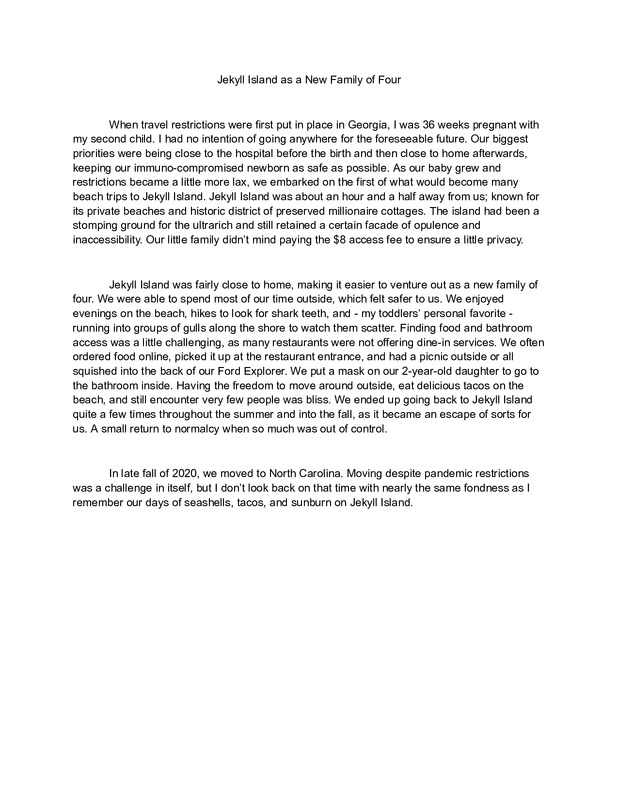
2020-06-01
The attached experience is more broad than what I alone felt comfortable with travel-wise. It is about the need to get out of the house and have some return to normalcy with a newborn and a toddler at home, while also trying to keep them as safe as possible. There were so many unknowns about how COVID worked, and so much certainty about the lack of immune systems in newborn babies. This travel story is significant because it reminds me of a season of life that was so incredibly challenging to navigate for a multitude of reasons, which only made little wins like afternoons on the beach so much sweeter.
-
2021-08-02
Traveling to another country has its difficulties and differences, especially when it happens after a worldwide lockdown. Seeing the way other countries operated in the wake of Covid-19 and the contrast of our own gave me a much larger point of view on how I process and see the entire world. Italy, Greece, Germany, Austria, the Netherlands. These places were just as impacted by Covid-19 just as much as the United States of America, yet they seemed to handle things remarkably different. A year or so before Covid hit, my family and I planned a cross country road trip spanning the brunt of Europe, which then would amalgamate into a 2 week cruise to see even more places. Long story short, it was a dream trip. Yet, Covid hit, and we feared we would not even get the chance to go. Luckily, lockdowns cleared up a few months before our trip, though people across the world were still wary of the virus. Going on the trip meant masks everywhere, which we were prepared for. Everywhere we went, everyone was polite, kind, kept their masks on and their own personal space, as did we. Now, this was not the first time I'd visited some of these places, but seeing them in the wake of a worldwide contagion left me with a new perspective and outlook.
-
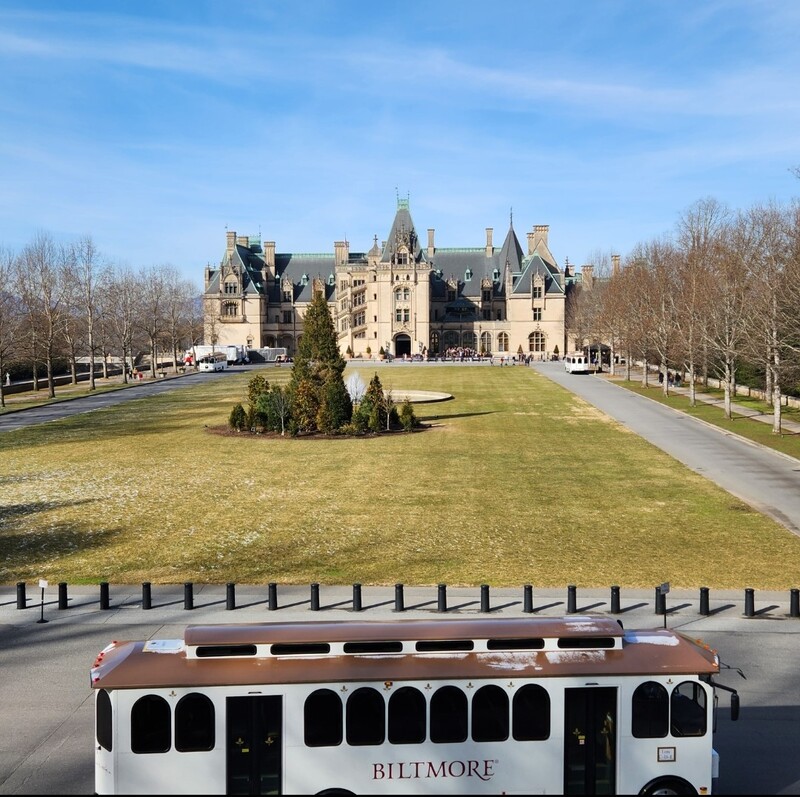
2023-01-21
The pandemic was a hard time for me. My wife's mental health was poor, I had just separated from the United States States, I became a stay-at-home father, and my father passed away shortly after the travel restrictions were lifted. We needed to get away for a while, so we chose to go to Ashville, NC. My wife and I love the mountains and the outdoors, so we booked a Air B&B in Ashville, NC because we talked about visiting there at some point for our anniversary.
Once we arrived, it was love at first sight. The mountain views were breathtaking, and we could not have asked for fresher air. My wife and I make it a point to not look like tourists when we visit somewhere new, so we do our best to blend in. Something we always do when we go somewhere new, is find a local bookstore. Once we did that, we went to the River Arts District and met a lovely man named Jefferey Burroughs who owned a jewelry store called Jeffery. Later, we found and enjoyed a local tea shop and delicious local food. We noticed almost immediately while walking around the city and going in and out of shops was that there were no Covid restrictions anywhere, which was welcoming.
What we were looking forward to the most though, was visiting the Biltmore Estate. The picture I am submitting with this log, is of the Biltmore House I took when we arrived. It is a beautiful home and a wonderful piece of American history. While walking through the house, you are in awe of how detailed everything is. The house had refrigeration, a large kitchen with modern amenities at the time, a large library, golden inlaid wallpaper, the first indoor pool, a gym, an indoor bowling lane, etc. It was so incredibly detailed and the thought that went into this house was very well thought out. The house was inspired by European architecture from George Vanderbilts travels. He wanted to create a place where, not only his family could come and enjoy, but also friends and their families. The house acted as a hotel when people were invited to stay. One could truly spend an entire day in that house and probably still not cover everywhere. If you ever have the chance, visit Ashville and the Biltmore Estate.
-
2021-03-29
I don’t think I had ever been prone to depression before the pandemic. I am generally upbeat, happy, and have a positive outlook most if not all of the time, but a deep, unshakable melancholy set in weeks after the state of California issued the stay-at-home order. Confined to my home, leaving only to buy groceries and other necessities, the only way I could keep in touch with friends and family was through social media. Through that medium, I received news of the deaths of friends or their loved ones, more deaths than I can count on my fingers. A facetime call from my mother let me know of the death of an elderly uncle, and then an aunt a few weeks later. My only window to the outside world was Facebook. If I wasn’t addicted to it before, I definitely was throughout the pandemic. With covid denial and conspiracies rampant on that, the outlook for a speedy end to the crisis seemed bleak. A deep depression overtook me. It manifested itself in a lack of interest in doing anything other than scrolling and sleeping. I felt like I gave up. The healthy habits I had developed as an adult didn’t seem important. The stagnant lifestyle I fell into coupled with the unhealthy eating habits I developed took its toll on me. I gained a massive amount of weight, approximately fifty pounds, my cholesterol levels and blood pressure shot up, and I was pre-diabetic by the time the shelter-in-place orders were lifted. The entire experience was surreal, but it was nearly over. All I wanted to do was to spend time with my parents and siblings and go anywhere.
My mother loves the ocean, so naturally, weeks or months after the stay-at-home orders were lifted, our first trip was to the beach. We drove a few hours from our home in Bakersfield to Santa Monica State Beach, both in California. Things were not quite back to normal entirely, but it was nice seeing people living life. I am sure there were a lot of smiles hidden underneath the masks as we walked along the pier, and the smiles, the joy, and the laughter were all quite visible on the beach where masks were either not required, or the mandate to wear them was not enforced. In either case, it felt like I was finally awakening from a long and somber dream.
As good as it felt to be out and about and among other people, with some restrictions still in place, I remember wondering if things would ever truly go back to normal. The crowds on the pier and on the beach were noticeably thinner than they were prior to the pandemic, and most people were hidden behind masks per the mandate, and restaurants only allowed take out or outdoor dining. Would this be the new norm? Another thing that really stood out to me from this trip, particularly as we stopped by the Glendale Galleria Mall on the way home, was how much more rigidly enforced the mask mandate was in the L.A. metropolitan area compared to my much more conservative hometown where it was loosely enforced if at all. The disapproving looks I got in the L.A. area for pulling my mask below my chin were the same looks I got in Bakersfield for wearing a mask at all. I found it funny and interesting how a hundred and fifty miles and a mountain range divided more than just the geographical landscape, but the cultural landscape as well.
That trip seemed like an eternity ago. The entire pandemic was like a fleeting nightmare, like a childhood trauma that our minds seek to suppress, the memories of it fade but the scars remain, and I, for one, enjoy and appreciate life a little bit more than I did prior to the crisis. My health, both mental and physical, has improved markedly.
-
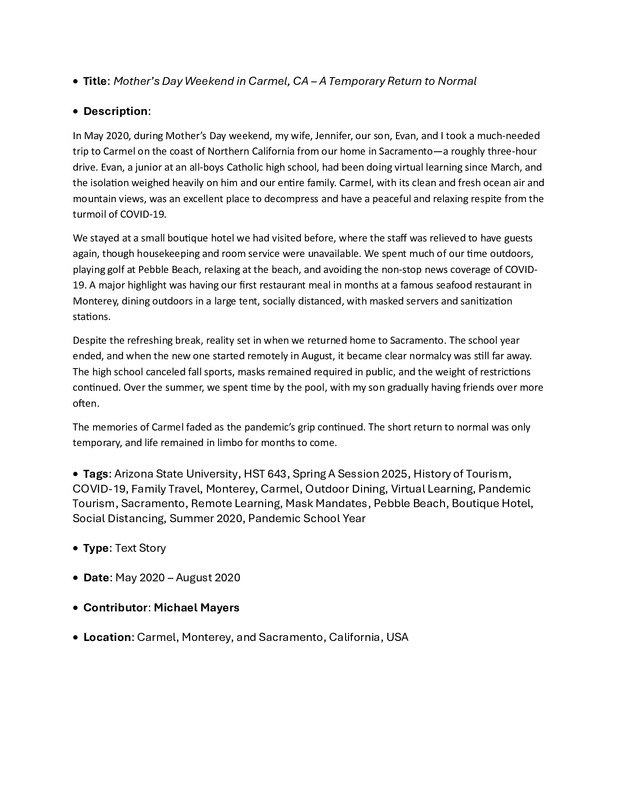
2020-05-10
In May 2020, during Mother’s Day weekend, my wife, Jennifer, our son, Evan, and I took a much-needed
trip to Carmel on the coast of Northern California from our home in Sacramento—a roughly three-hour
drive. Evan, a junior at an all-boys Catholic high school, had been doing virtual learning since March, and
the isolation weighed heavily on him and our entire family. Carmel, with its clean and fresh ocean air and
mountain views, was an excellent place to decompress and have a peaceful and relaxing respite from the
turmoil of COVID-19.
We stayed at a small boutique hotel we had visited before, where the staff was relieved to have guests
again, though housekeeping and room service were unavailable. We spent much of our time outdoors,
playing golf at Pebble Beach, relaxing at the beach, and avoiding the non-stop news coverage of COVID-
19. A major highlight was having our first restaurant meal in months at a famous seafood restaurant in
Monterey, dining outdoors in a large tent, socially distanced, with masked servers and sanitization
stations.
Despite the refreshing break, reality set in when we returned home to Sacramento. The school year
ended, and when the new one started remotely in August, it became clear normalcy was still far away.
The high school canceled fall sports, masks remained required in public, and the weight of restrictions
continued. Over the summer, we spent time by the pool, with my son gradually having friends over more
often.
The memories of Carmel faded as the pandemic’s grip continued. The short return to normal was only
temporary, and life remained in limbo for months to come.
-
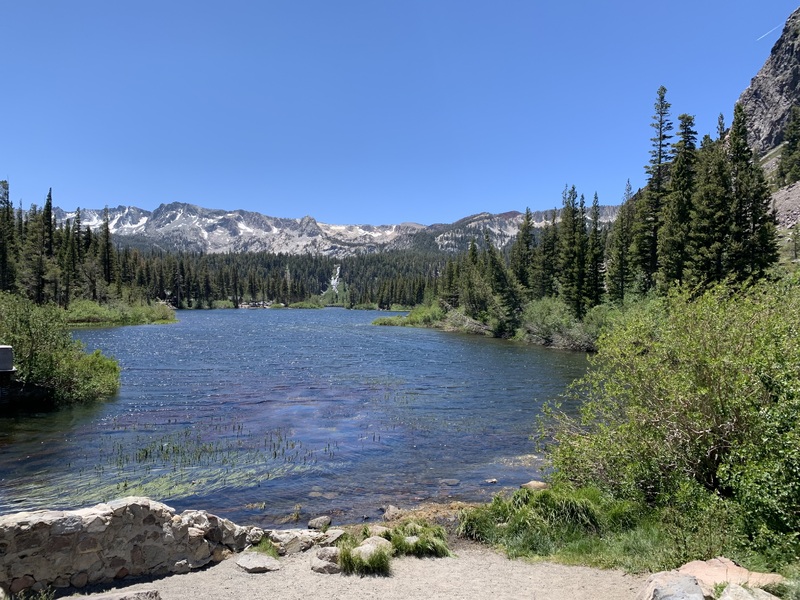
2020-07-03
I am sharing the first photograph I took on a camping trip in Mammoth Lakes, CA in July 2020. I spend a lot of time outdoors camping and hiking. At the beginning of the COVID-19 outbreak, I cancelled my planned trips for the first four months. I also stopped hiking because local trails were so busy and I tended to avoid close distance to strangers even outside. The trip to Mammoth Lakes was setup because my sister and I decided we had to get outside. Masks were still required in many public places, but there weren't restrictions on camping. I remember two distinctive reactions to the camping trip. It was our first time being around a lot of other people in public and so we were on high alert to avoid close interactions and were wearing masks any time we went inside the little campground shop for firewood. What came as a shock was the relaxed manner the other campers enjoyed their weekend. I felt like I was outside looking in at an exhibit. I was happy to be outside, but I felt removed from all the other campers. To see others in person experiencing the pandemic so much differently than I was, felt very isolating. However, we drove to Mammoth to get a taste of regular life and it did do that as well. Our last night there, a bear wondered into the campsite. It was scared back into the woods about 20 yards from our campsite. The next morning the bear wondered back in and I woke up to it smelling around our neighbor's tent. The bear eventually went on its way. I was so grateful to that bear for giving me a story, an experience. I had felt like every day was the same since March and was just happy to see a big beautiful animal. I was also grateful to have a camping trip that helped me to feel that at some point I'd do normal things again. When something so sudden and intense like a pandemic occurs I think it's normal to feel like nothing will ever be the same again, but the camping trip and being outside felt normal enough to give me a little peace.
-
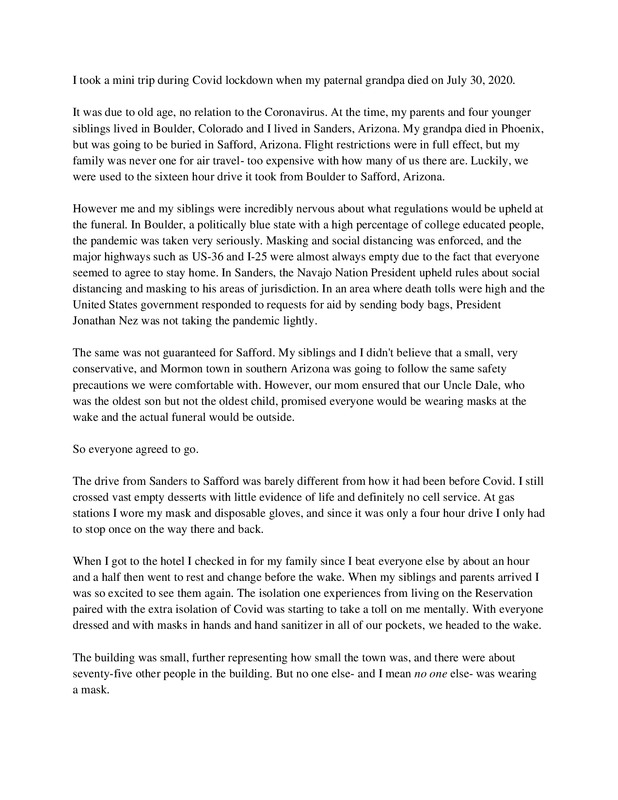
2020-08-03
This story conveys the experience me and my 4 other siblings had when we attended our grandfather's funeral in August 2020. In the super conservative town of Safford, Arizona, no one attending the funeral (except us) wore masks.
Our extended family didn't believe that Covid-19 was real, or something to be stressed over. This story shows how we tried to navigate an event we thought would have precautions, and then didn't. Lastly, this story is important to me because even though we were stressed and panicked over attending a funeral without masks, my siblings and I grew closer after this.
-
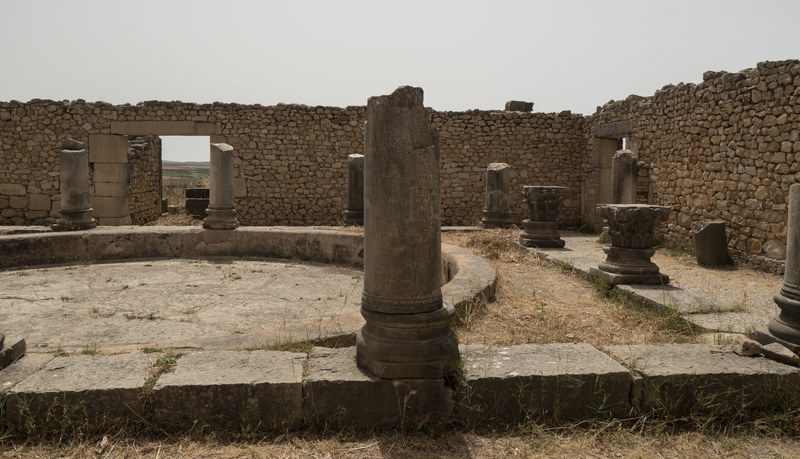
2021-08-19
I did not travel outside of the country when covid restrictions were lifted, but I would've visited Italy. If I could've traveled anywhere after the Covid restrictions were loosened, I would have visited Italy to visit my sister. My sister lived in a small town near Rome for 9 months between 2021 and 2022. I would have visited the Circus Maximus, the Tomb of Julius Caesar, the Pantheon, and the various aqueducts. The Colosseum is one of the main attractions in Rome, but I would save it for last or visit it another day. I would have documented this through various methods such as social media, journaling, and/or painting my favorite monuments.
-
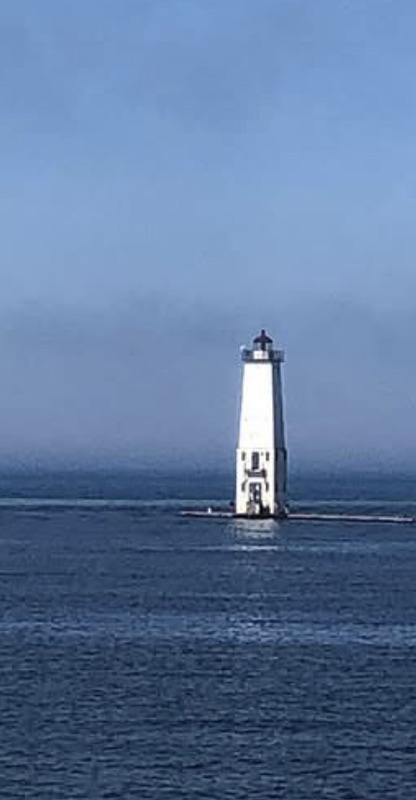
2020-06
The lighthouse is something that represents safety and security. Walking on the beach and being along the water is something that I find healing and peaceful. I used to live in this area and I am familiar with the sites and was motivated to spend time outdoors.
-
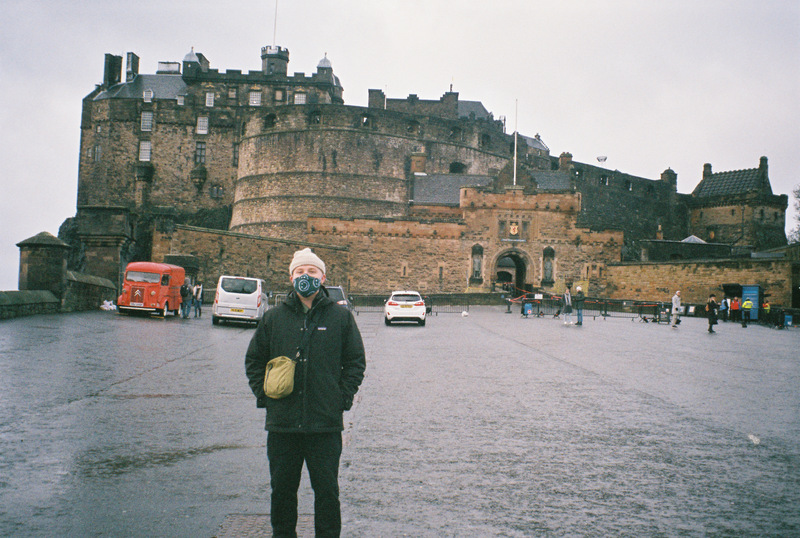
2022-02-12
After my husband and I were married in May of 2021 in our backyard with twenty vaccinated friends and family members, we planned to visit Scotland for our honeymoon as soon as possible. I can’t remember what the restrictions were like at that time, but having the vaccine made us both feel much more confident venturing out of our communities, which for me meant my job at a local coffee shop in Nashville and just a few, very close friends who were vaccinated and adhered to the recommended social distancing and masking practices. On our wedding night, we stayed at a hotel in downtown Nashville, wearing masks in all the common areas, and the next morning we had breakfast and returned home to our families who were in town for a couple more days.
I remember checking websites frequently to determine when we would be able to travel to Scotland. We refreshed the CDC, U.S., and U.K. government sites daily to see if our honeymoon could happen yet. At some point the websites revealed that travel was allowed again with the stipulations that first, we show our vaccination cards at the British Airways desk with our passports and tickets and second, we had to present negative test results before returning to the States. While it still felt like these rules could change any minute depending on case counts in either country, we took the risk and bought our tickets.
The time came for the trip, February, 2022, and getting out of the country went off without a hitch. The U.S. did not have an official app for storing vaccination card info like some other countries, but we found a third-party app called VeriFLY that was collaborating with British Airways to make confirming our vaccination status a tad bit quicker when checking into our flight at the airport. VeriFLY did as promised; our vaccinated statuses were confirmed in short order and we were on our way!
Now, I mentioned that we had to have a negative COVID test to return home. That reality colored our choices throughout that entire two-week trip. Sometimes that looked like attempting to take public transit at off-peak hours to avoid crowds. Londoners were still largely masked, but if I remember correctly it was no longer a requirement there, which certainly gave us some anxiety. We weren’t necessarily worried about COVID being really harmful to our bodies, though we miraculously hadn’t caught it in two years so we weren’t sure how it would affect us. Our anxieties were instead tied to being eligible to return home. I had been a barista since graduating from college in 2016 and my husband was a bartender and musician, so we were afraid of the extra financial burden of having to find a place to stay last minute, booking new flights, and buying food if we had to stay out of the country for another week or two.
In the pictures, even when we are outside, we frequently forget to remove our masks for the camera. There is a wonderful picture of my husband and I in front of Edinburgh Castle that would look so much better in a frame if our noses and mouths were visible. In contrast, there were other moments, like in a cozy speakeasy in New Town, Edinburgh, where the fears died down for a minute and we slipped the masks into our crossbody tourist bags. When a bookshelf opens up in the back of a fake barbershop that takes you down into a warmly lit basement with warm, low lighting and way more seating than you thought was possible, inhibitions fade and wonder takes over. Well, at least for my bartender husband and I.
That was the manner in which we traveled from London to Edinburgh, Bath, and back: masking when we couldn’t social distance except for a rare few cocktail bars, travelling between morning and evening rushes, and sanitizing our hands as frequently as possible. Besides jetlag in the beginning, we both felt healthy and well for the duration of the trip, but we had three more hurdles to overcome.
The last few days of our trip were spent in a neighborhood of London called Hackney-Wick where our AirBnB was a cozy, modern tiny home with an alley entrance. It was our favorite place we stayed the entire vacation. We arrived there very exhausted from our travels and eager for a few days of relaxation before the long trip home. Two days before our departure, however, Russia invaded Ukraine. We knew we were well out of harm’s way in England, but our relative proximity compared to our home in Tennessee made the exploding conflict feel much more imminent, especially when Boris Johnson made some bold comments about Vladimir Putin that week when nobody knew if Russia was prepared to make a larger attack. The last few nights in the AirBnB were a little less restful after that as we watched BBC around the clock for both COVID news and updates on the war.
There was one more stipulation about our negative test results - they had to be performed within 24 hours of boarding the plane. In a generally unfamiliar and exceedingly sprawling city with no knowledge of what pharmacies were more reputable than others and regardless desperate to get tested in that short window, we landed upon a small clinic that we would have to take the London Underground to and finally walk a couple blocks. I remember we showed up an hour before our appointments just to be on the safe side and the clinic was pretty quiet, so we stood around on the sidewalk still nervously checking BBC for anything new that could impact our travel. The tests were performed and we were assured there would be results in our inboxes sufficiently before takeoff, so we prayed that would be the case.
-
2020-07-01
In August of 2019, my sister gave birth to a baby girl, my first niece. At the time I had just started a new job and was accruing vacation time but did not have enough to cover travel to San Diego, CA for a week. In February of 2020, I booked a flight to visit my sister and meet my niece in May of 2020. Those plans were then canceled the very next month when a pandemic was declared and the country was placed on lockdown. In April, I was able to reschedule my trip for July of 2020.
Flying from Bismarck, ND to my hometown while most of the country was still on lockdown was a different experience. Before COVID, every plane I had boarded was near, if not at, capacity. Flying during COVID saw several empty seats with no two people sitting directly together - even if they appeared to be part of the same party. One observation I had was that while every plane was sanitized upon passengers deboarding, I never saw anyone sanitize any gates while I moved through and sat in airports.
Driving through San Diego, I was shocked to see open freeways with far less traffic than I had ever seen during peak hours. Restaurants were still limited to takeout (though I was really only there for the taco shops anyway) and most indoor venues were still closed unless necessary businesses. The businesses that were open to the public naturally required masks. As I was there to meet my niece and spend time with my sister, I loved not having to make up excuses to avoid meeting up with any old friends and being able to focus on time with family. It was strange to see my hometown, a vibrant and busy city, locked down and the roads and businesses empty. I felt even more grateful for the opportunity I had to travel and still be able to spend time with family since we never know when it will be too late.
-
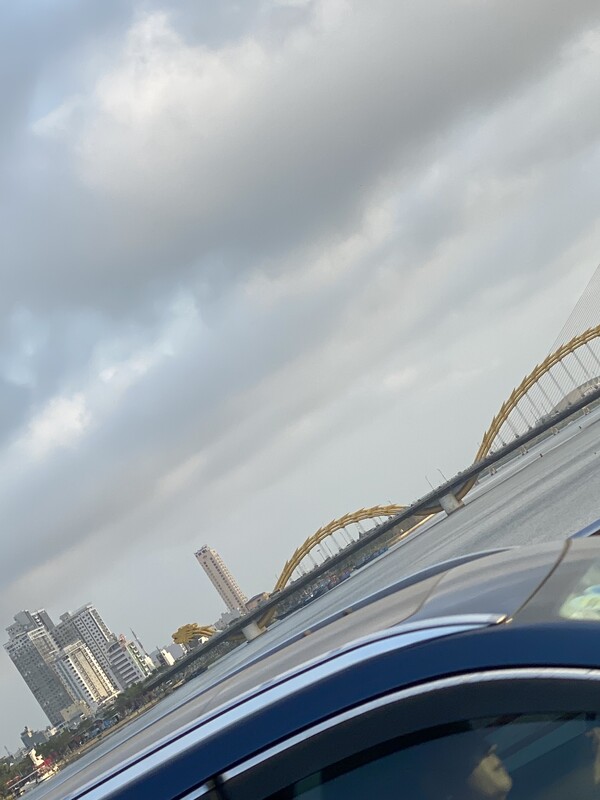
2020-03-04
My Covid travel story is a bit unique. I was in the Navy at the time assigned to the USS Bunker Hill, a guided missile cruiser attached to the Theodore Roosevelt strike group. We deployed from San Diego, CA to the South China Sea area of operations early January 2020. When we left for deployment, covid had started gaining traction but was nowhere near the global pandemic levels it would soon reach. In the first week of March 2020, the Bunker Hill pulled into Da Nang, Vietnam on a port visit/diplomatic relations mission. We were scheduled to be there for four days, and the first three days were filled with adventure, laughs, and “drinking like a sailor.” On the fourth day, an all-call message was sent out to every crew member to immediately return to the boat. Once assembled our captain informed us of major covid outbreaks in Da Nang and outlying villages along with the outbreak back home stateside. For the remainder of that fourth day, we were restricted to the pier and not allowed to leave our mooring station. Fortunately for us, food and beer were provided on the pier to provide some sort of leisure. Although we knew dark times laid ahead of us, everyone in the crew including senior leadership, unwound and drank with reckless abandon. We were only 2 months into a 9-month deployment and we knew that this would be the last bit of freedom until we returned home, and we made sure to savor every sip. The next morning we lined the rails of our ship in our dress white uniforms saying goodbye to dry land for the next 5 months. The time at sea was the least of everyone's worries, rather we frantically tried to make sense of the global situation with Covid and what kind of world we would be returning to upon completion of our deployment.
-
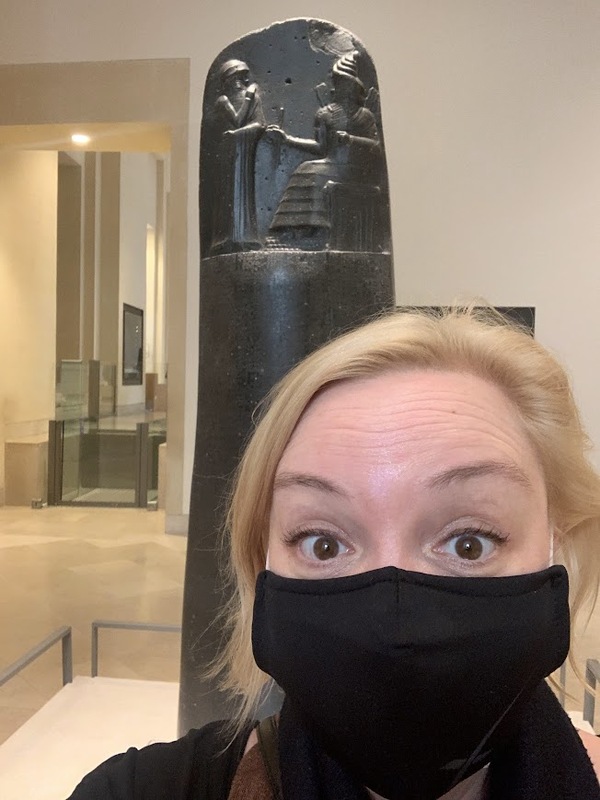
2021-10-30
During the COVID-19 pandemic, I found myself working from home for over a year. Our area and friends were extremely cautious about public health (Southern California), so we didn't explore international travel until after we were fully vaccinated in summer of 2021. In the fall of that year, we visited Paris for the first time and went to the Louvre.
During the 1+ year on self-imposed house arrest, I needed something to keep my mind busy. I took a number of online classes about Ancient Egypt, Greece, and Mesopotamia, historical subjects that I've always returned to whenever I had time in life. But given the frankly unimaginable amount of free time I had in 2020, I delved in further than ever, and even managed to teach myself hieroglyphics.
By the time we could travel, a first visit to the Louvre seemed like the ideal place to experience some of this new knowledge first-hand. In these photos, I'm in front of the Law Code of Hammurabi and a bust of Akhenaten, one of Egypt's more fascinating pharoahs. We had to show proof of vaccination to travel as well as enter the museum, and masks were required at all times.
One of my favorite things about these photos is someone trying to express a lifetime's worth of excitement using one's eyes only. I look insane. But the experience truly was important to me and now serves as a snapshot of post-pandemic travel and life.
-
0025-01-27
During the COVID-19 pandemic I determined to go back to college. At that time, in 2020, I was 38 years old. Most of my life I worked in construction and related industries. From 2009 to 2011, as a result of the recession, I completed two associate degrees; following which I promptly went back to work in construction. The pandemic posed an opportunity for me to continue my education. In the Fall of 2020, I began attending UCR. In the Spring of 2022, I graduated with a BA in Philosophy. Being a single father, I have not had many opportunities to travel due to financial constraints and time constraints.
If I could travel anywhere on Earth, I would like to travel to Greece. I would not desire to travel a constrained and guided tour. I would not wish to have each step and location planned. Rather, I would like a couple months to saunter through the ruins in Athens, Particularly the Lyceum where I might find some hidden spot with a view, an alcove where I might imagine Plato and his musings, a place to sit and think deeply of the minds and thoughts of those people which lived there over two thousand years ago. During this time, I am likely to journal my thoughts as random ideas and questions enter my mind, a hobby I practice throughout everyday life. I would prefer to soak up a single place for weeks than to rush to see “everything”—in such a rush much is likely to be missed and much would remain unseen.
I am 42 years old now. My daughter is 16 years old. Mayhap my dream of traveling to Athens will happen after I complete my MA History degree. Only the view of the Lyceum would include the sight of my daughter and my imaginings of her musings, as well.
-
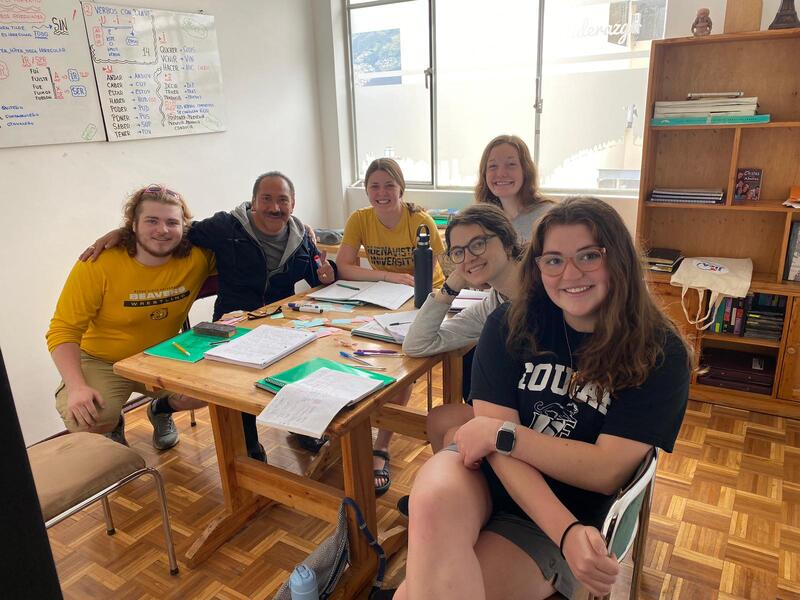
2022-05-26
This photograph is from a trip I took to Ecuador while in undergrad in May of 2022. The trip was school-sponsored and was an immersive Spanish-learning trip. Although the trip took place almost 2 years after the outbreak of the pandemic, this was the first trip I took after COVID-19. There were still a lot of COVID-19 restrictions in place, and there was a point where we weren't even sure we would be able to go because COVID-19 cases had resurfaced with a vengeance. Before going, we all had to get a COVID-19 vaccine and before returning, while we were still in Ecuador, we had to take a COVID-19 test to make sure we weren't infected with the virus before coming back into the US. Throughout the trip, we also had to wear masks whenever we were out in public or in close quarters with others. Even though these restrictions were in place, it was still an amazing trip. The photo I attached to this submission is a picture of a few of us in our Spanish class. The trip was three weeks long, but every morning we would take Spanish classes before we began sightseeing. Some of this sightseeing included touring Quito, staying in the rainforest for a week, visiting art and history museums, going to indigenous markets, and hiking volcanos. Of course, all of these experiences were incredibly memorable and fun, but sometimes, my greatest memories of the trip come from the simple moments. The attached photo includes one of these simple moments: learning and laughing amongst new and old friends. The experiences were magnificent, but the relationships I built on this trip will last a lifetime.
-
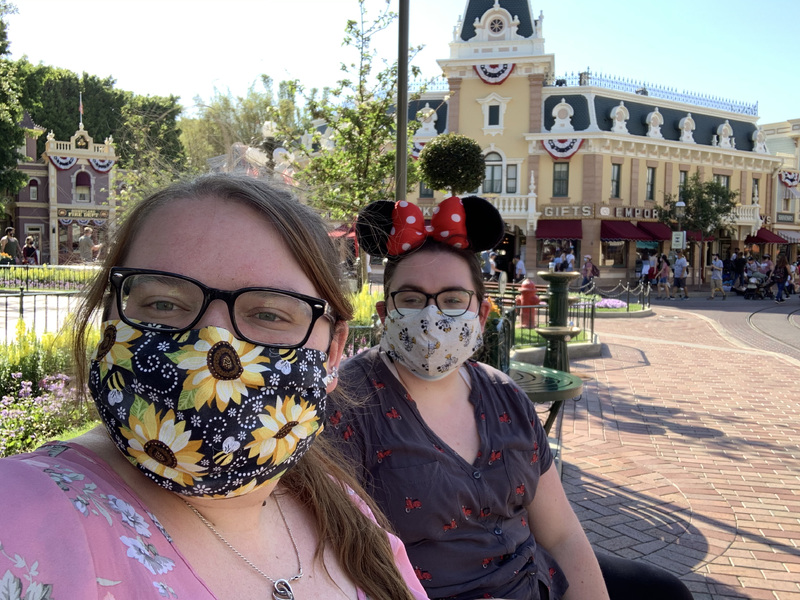
2021-05-24
March 2020: a week before my twenty-first birthday. Working at a senior living community on my lunch break I was watching videos on YouTube preparing for an upcoming trip to Walt Disney World. The next day, I received a signed letter from my supervisor saying I was an essential worker and if I was pulled over to show it to the officer. Two days later, I had to leave home, because a family member was scared, because they are immunocompromised. Plans were cancelled, my birthday came and went, and I was unable to spend it with half my family worrying if I would give my remaining family this deadly, mysterious illness.
Fast-forward to May 2021: my sister and I’s first trip to Disneyland since it’s reopening less than a month earlier.
Disney runs deep in my family. My grandparents spent their honeymoon there. My parents got engaged there. I grew up going there bi-weekly. Even though I don’t remember it, my favorite photos are of my young family together with the castle in the background, on the carousel or train, or young me with Sleeping Beauty. I have over three hundred Disney pins and my sister almost that many. To say the least, Disney was the first place we planned to go once the world started to open again.
As the theme park just reopened, Disneyland was still in its testing phases of what was compliant with CDC guidelines while trying to provide a streamline, enjoyable experience for guests. I remember wearing masks, hand sanitizer everywhere, plexiglass dividers in lines, restaurant windows, and cash registers. I remember how strict cast members were and how I sympathized with them trying to keep guests safe from each other. One experience that comes to mind was while in line for Pirates of the Caribbean. The line was quite long and it stretched over to the Haunted Mansion. A Haunted Mansion cast member directing traffic, while what seemed on repeat: “please keep your mask on” and “keep space between your party and others.” During this time, I was interviewing for a position at the Disneyland Hotel, and if I got the job (I did), I knew this would be something to look forward to.
Anyways, a guest in front of my sister and I continued to lower her mask and become confrontational with this cast member. Seeing, my sister and I were siding with the cast member and not her even though we didn’t say anything, she started to become confrontational with us. It was an awkward incident, which led to my sister having a panic attack. We left the park soon after, cutting the day short. What was once a place of escape became the place we needed to escape from. Her anxiety stemmed from the crowds, the unruly guest, and the uncertainty of if this day of leisure would be worth it or cause us to become ill as neither of us had gotten sick with COVID-19 by that time.
Years later, it is once again a place of comfort, but back then, I wish Disney would have stayed closed longer, trained cast members how to handle guest confrontations rather than throwing them out there, or that we didn’t jump into going so soon before proper guidelines and safety measures were enacted.
-
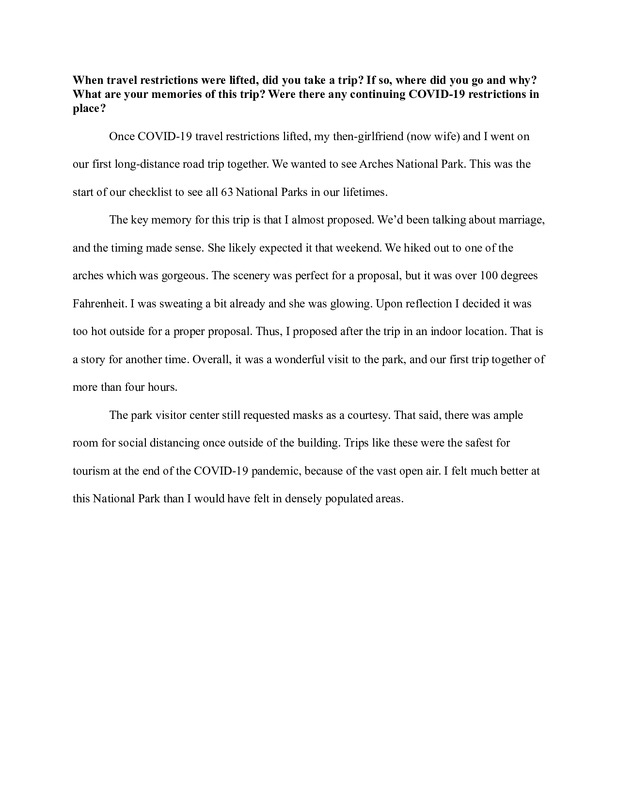
2022-06-13
Once COVID-19 travel restrictions lifted, my then-girlfriend (now wife) and I went on our first long-distance road trip together. We wanted to see Arches National Park. This was the start of our checklist to see all 63 National Parks in our lifetimes.
The key memory for this trip is that I almost proposed. We’d been talking about marriage, and the timing made sense. She likely expected it that weekend. We hiked out to one of the arches which was gorgeous. The scenery was perfect for a proposal, but it was over 100 degrees Fahrenheit. I was sweating a bit already and she was glowing. Upon reflection I decided it was too hot outside for a proper proposal. Thus, I proposed after the trip in an indoor location. That is a story for another time. Overall, it was a wonderful visit to the park, and our first trip together of more than four hours.
The park visitor center still requested masks as a courtesy. That said, there was ample room for social distancing once outside of the building. Trips like these were the safest for tourism at the end of the COVID-19 pandemic, because of the vast open air. I felt much better at this National Park than I would have felt in densely populated areas.
-
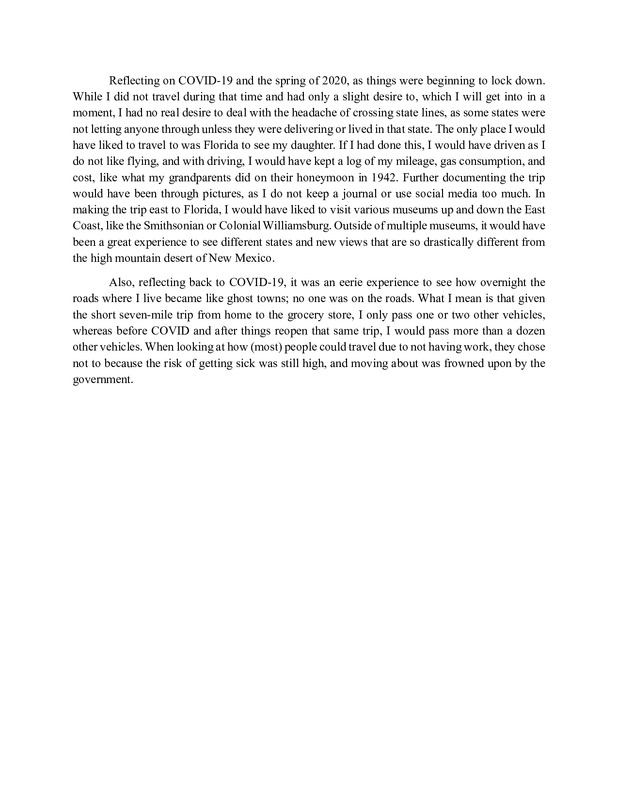
2020-05-01
A wishful thinking of where I would have liked to travel and a short reflection of what the area I lived in was like.
-
2020-05-10
TEN LITTLE TENANTS IN THE CORONAVIRUS CRISIS
A little story from the lockdown By Berthold von Kamptz (2020, Hamburg, Germany)
Before the corona period:
Once upon a time there were ten little tenants. They lived in an apartment building near Charlesburg near Castle Newman Street in Atlanta, which was managed by the strict landlord Johann Hermann, a real estate agent and philistine, and his son Rudolf, an often rebellious son and sound engineer who owned a small music studio. The ten tenants lived in the red brick apartment building and not always harmoniously. But as long as they avoided each other and did not know each other well, it worked out reasonably well. Either they were too busy with their work, their relationship, family and other obligations, so that in this often stressful time before the corona pandemic there was hardly any time. Only Grandma Leni asked how Mr. Lemke, Mr. Schmitz, Mr. Weidmann or Mr. Ehlert were doing. Because she was a pensioner, was curious, interested in other people and had time. Otherwise - if you were honest - almost no one was interested in anyone else. Everyone had their own life, something to do with themselves. Most people left the apartment in the morning and then disappeared into the grey mass. And Grandma Leni thought: "My contacts in the building are only superficial. How I hate that." Tenant No. 1: The former humorous gallery owner Jochen Schmitz from Switzerland lived in the basement. He represented many young artists, had sales skills, good taste and often cracked jokes. And what artists he had! Neo-expressionists, conceptual artists, pop artists and cubists. What exhibitions he did. Nobody would have thought of that before! Tenant No. 2: And now we come to Grandma Leni. She lived on the left on the ground floor. Her name was exactly Grandma Leni Saubermann. She always read a lot, knitted and lovingly looked after her two grandchildren, who often visited her, as did her daughter Ruth. At 85, Grandma Leni was fit. And many thought: "What more can she do." But her son Hugo, with whom she had little contact, thought: "She's old, just wait a bit and then she'll leave us." Tenant No. 3: On the right on the ground floor lived the artist Fritz Weidmann. He came from Europe. He always wore trousers with holes in them. He was not successful as an artist. The gallery owner down in the basement didn't want him. Schmitz said: "At 40, he's too old. His work leaves me cold." So Fritz drank a lot and was often drunk. And when he raged, you could hear it throughout the house. And many said: When will the landlord finally throw him out! Tenant No. 4: Upstairs on the second floor on the left lived the singer Daniel Lechler. He often wrote and sang his songs - sometimes even late at night. And that really annoyed the neighbors below and next to him. But that's how he was. Vain and completely gay, that's just how this singer was. He had a friend somewhere that nobody knew.And the neighbor Herbert Lemke in particular got upset and hated guys like Daniel. He had to get up at 5 a.m. because he was a baker! Tenant No. 5: And now we come to the baker Holger Lemke. He lived on the second floor to the right, opposite Lechler's apartment. Lemke was always upset and the only reason they didn't argue was because Mr. Lechler rarely met him in the dark stairwell. And Lemke hated people who were different - people like Lechler, because he was also politically extremely right-wing. Tenant No. 6: To make matters worse, a tenant named Gustav Ehlert lived above him on the third floor to the right. And he wasn't politically right-wing, but politically extremely left-wing. He had lots of left-wing websites with multiple links. And sometimes he was inclined to violence. And he always felt miserable when he heard the tenant Lemke running around the apartment. And heard the people he hated ranting. And one day he came up with a nasty plan. Tenant no. 7: And on the third floor to the left lived Ali with his wife and child. The family came from somewhere in the Middle East Europe - presumably. After the arguments with Holger Lemke, which were caused by both of them, he was protected by Gustav Ehlert, who lived opposite his apartment on the right. Whenever there were problems, he simply went over to Ehlert. Tenant no. 8: Above Ali on the fourth floor to the left lived old Knut Rückner, who was suffering from cancer. He was alone, depressed and addicted to medication. He had an uncertain future. But he did not want to end it because he was a fighter. Reason prevailed here. Tenant no. 9: On the fourth floor to the right opposite Knut Rückner lived Tim Rösler, who often argued with his wife Anna since he had recently been unfaithful. At this point, Anna could not yet decide whether she should forgive her husband and stay with him, or not forgive him and leave him completely. She had already taken another room in Woodberry City in Atlanta and only lived with her husband from time to time. At first he begged her to stay with him. But gradually he had had enough of her swearing, accusations, frustration and jealousy. And he thought: "If it doesn't stop, I'll kill her or leave her, then finally stop shouting!" Tenant No. 10: And in the attic lived the graphic artist Albert Eisenblätter, a graphic artist who had been left by his girlfriend and who either cried now and then, watched TV or masturbated in his attic apartment. He had messed up several relationships. This was now the fourth! The landlord Johann Hermann and his son Rudolf: They lived in a single-family house in Greenwood City (Atlanta). And the father-son relationship was not always easy. Johann Hermann had a lot to do with managing the property. Since Rudolf often didn't help much in the past, this sometimes caused the relationship to cool down.Because Rudolf had a job and a lot to do. And therefore often had little time for property management. He was a sound engineer, was involved in various small music productions - also in advertising - and also had a small recording studio, but what he earned was not enough to live well from it. He had also gambled in the casino, had too many women who often stole money from his pocket. At some point he was in debt, it was no longer possible, and there were discussions with his father. And then everything came out. And then his previous life was over. And so he promised to pull himself together. And also to do property management and earn some extra money. His father told him: "You have to change, because if you don't, it will tear the whole family apart." And so they did property management together and Rudolf pulled himself together after these incidents. And soon father and son got along well again. And his father encouraged him. Then suddenly Corona came... Then suddenly Corona came and changed everything. Like a huge monster, Corona swept across the whole world. And turned everything upside down. In America. In Europe. In Afrika.... During the lockdown, all shops closed. Hotels, sports clubs, concert halls, opera houses, bars, restaurants, hotels, clubs, brothels, cafes,... Only supermarkets, doctor's offices and pharmacies were open. The landlord Johann Hermann and his son Rudolf: They panicked. Johann immediately bought masks from the pharmacy. And Johann immediately sent his son to panic buy. And soon the cans were piling up in the basement. But there was almost no toilet paper anywhere! It was a lot of running around to at least get kitchen paper as a toilet paper substitute. Fortunately, Johann earned well and had fortunately saved a lot of money during the Corona period. That was enough for the time being. Rudolf was not so lucky. He lost his job as a musician because concerts were not allowed and contact restrictions necessarily applied and could no longer keep his head above water financially. So Johann helped his son and then he managed to make ends meet. As the number of people infected with Corona kept increasing, Johann and Rudolf stocked up on food in the basement and then stayed at home. They were afraid. And they told themselves: If they stayed at home, nothing would happen. When they turned their attention to the property management, they noticed something frightening: There were more and more arguments among the tenants, some had not paid. Everyone against everyone, nothing had been normal since the Corona crisis. And if it continued like this, chaos would break out. That had a lot to do with Corona, Corona acted as a problem amplifier, nerves were frayed and this led to more arguments. Also due to tight budgets. Johann often said: "But often it is not just Corona, but also the people themselves, who have not learned to show solidarity and deal with problems. Many were doing too well before the crisis,could have everything they wanted and now there is a lockdown. A lot of things are different. You can't blame everything on Corona." Victim number 1 was tenant number 10: graphic artist Albert Eisenblätter was the first to freak out. He couldn't handle the lockdown and the loneliness at all, he kept thinking about his ex-girlfriend and masturbated constantly. And he often drank too much alcohol to the point of almost fainting. He couldn't handle losing all his graphic design jobs at all. He could no longer pay the rent and so Johann Hermann and his son Rudolf sent him several reminders by letter. They wanted to throw him out if he could no longer pay the rent. Then one day during the lockdown he stopped responding to their reminders. Finally, Johann and Rudolf drove to his apartment and knocked on his door. But he didn't open it! He seemed to have disappeared off the face of the earth. Then Johann called the police and they broke down the door. Then they saw Albert Eisenblätter and the rope around his neck. He had hanged himself! There were only 9 tenants left in the house. Victim No. 2 was tenant No. 8: Knut Rückner could not cope at all with the fact that tenant Eisenblaetter had hanged himself above him. He was still battling with his cancer. He only made it to his doctor's office in great pain and with the risk of contracting the coronavirus. And he couldn't even get all of his medication from the pharmacy. He only got one pack of antidepressants. Then he was taken to hospital and died. Then there were only 8 left. Victim No. 3 was tenant No. 2: Grandma Leni Saubermann fell into depression. Her grandchildren could no longer visit her during the coronavirus lockdown because of the risk of infection. She became increasingly lonely and depressed. Finally, her daughter Ruth made sure that she went to a nursing home. But before that, she caught the coronavirus when she secretly met an old friend. So she ended up in a nursing home and died a little later of Covid-19. Then there were only 7 left. Victim No. 4 was tenant No. 3: Tenant Tim Rösner did not die. But the lockdown frustration and certain circumstances caused him to become angrier and angrier. And his anger was directed at the gallery owner down in the converted basement, who did not appreciate his art. How humiliated he felt! He had already earned little from his art before and then Corona came along, so that he could not pay his rent. Finally, at some point he went crazy and beat up the gallery owner and devastated his gallery. He was then taken away by the police and had to go to a psychiatric hospital. Then there were only 6 left. Victim No. 5 was tenant No. 1: The Corona crisis also made the gallery owner Jochen Schmitz feel bad. After being attacked by the artist Fritz, he became depressed and suffered from post-traumatic stress disorder. He could no longer pay the rent,had to move and rent other premises. Nobody knew for sure whether he went bankrupt. When he moved out there were only 5 left. Soon after, the apartment was rented out again. Victim No. 6 was tenant No. 9: After a short period of peace in the apartment building, Tim and his wife argued more and more. The arguments were often so violent that everyone in the house heard everything. Then one day he almost beat her to death. Then he had to go to prison. She barely survived and then moved out too. There were only 4 left. Victim No. 7 was tenant No. 7: Ali got it in the fall. He attacked Mr. Lemke, Mr. Lemke attacked him. Nobody knew exactly who started it. Since Corona, it got worse and worse. Mr. Ehlert, who lived to his left, wanted to help him wherever he could. Even the singer Daniel Lecher! When Ali left the house one day, he was knocked down by an unknown man wearing a mask. The police could not prove anything against Mr. Lemke. Maybe it wasn't him. Only Ehlert suspected that Mr. Lemke was behind it. Ali was taken to the hospital. His family then moved out of the apartment. Ali did recover. But as we later learned, Ali became infected with Corona through unfortunate circumstances. So Ali eventually died of Corona. Then there were only 3 left. Victims No. 8 and 9 were tenants No. 5 and No. 6: After Ali's attack and his entire family moved out, Lemke and Ehlert got into increasingly serious arguments. When they met by chance outside, a fight broke out. Later there was a stabbing and both killed each other. So there was only one left. Victim No. 10 was tenant No. 4: One day during the Corona crisis, singer Daniel Lechner learned that his friend had contracted Corona in May 2020. According to stories, he visited him. The latter then died suddenly. Daniel became depressed and drank more and more. Then one day during the corona crisis he fell from the first floor. He later died in hospital. It was inexplicable and incomprehensible. Then everyone left the house and then there were only 0. The landlord Johann Hermann and his son Rudolf: The fact that so much was happening in the apartment building frightened Johann Hermann and his son Rudolf. It was pure madness! That wasn't the case before the corona crisis! First bills piled up. Then there was the first major trouble. The unpleasant tenant Lemke wanted a lot of repairs to be done in the house. All of the electrical systems in the basement, the doorbell panel, lights in the entrance, pipe inspections in the basement, a new refrigerator and the heating in his apartment, which was supposedly making noises. Some of it was certainly necessary, others not. A lot of it was lies or made up. He wanted to have the whole house done ideally and then live cheaply! And he acted as a caretaker, threatening to inform the building authorities.Who was going to pay for all of this? And all of this during the lockdown and the Corona crisis that followed! A little later, an unknown person caused a riot in the house and damaged doors in the basement, the railing, the steps, and rubbish was scattered around the basement. Nobody knew who it was. Johann suspected that it was a frustrated tenant or a tenant who had gone crazy during the lockdown and who hated Johann and Rudolf. Probably the evil Lemke! Or Ehlert - he was also a suspect! But nothing could be proven if there were no witnesses. Because suspicions were not enough for the police. Then, a little later, there were serious conflicts between the tenants. There were the first deaths. First the tenant Eisenblätter, then the tenant Rückner.... Every time Rudolf heard of a tenant's death in the apartment building, his hands shook. Johann was also worried. "During the Corona crisis and the lockdown, many people are going crazy. Unfortunately. Everyone against everyone. At first, during the Corona crisis in March and April, solidarity was the order of the day. But the longer the Corona crisis lasts, the more aggressive many people become. The good people seem to be dwindling. In the past, the bad people lived at the expense of the good. If everyone becomes bad, then even the bad people will eventually be afraid and no longer want to live in such a world. A philosopher once said something similar," said Johann. It was an attempt to explain these strange occurrences. Because of all the problems in the house, they eventually got into financial difficulties. Then their son Rudolf had an accident during the second lockdown. He drove drunk into a tree and then died. A little later, their father Johann died of a heart attack from grief. Uncle Jochen Hermann was Johann's brother. He inherited the apartment building from his brother. Renovations were carried out and new tenants moved in. Everyone thought that Jochen Hermann had solved all the problems with the apartment building. But then another disaster happened later: the house was set on fire by a leftist, a friend of Ehlert. Several new tenants died and the house burned down almost completely. Only rubble towered into the sky like individual memorials. They were images like from a war. The conclusion: And the undertaker Walter had a lot to do. And he shamelessly exploited the grief. For example, he made a mourner pay him 3000 euros for an expensive coffin and instead of the expensive coffin he only took a cheap coffin for 300 euros. That's how he made a profit. And how good the business was! Lots of people died - like mayflies - of Corona or perished or killed themselves or each other. "I love the Grim Reaper as long as he doesn't find me. And if he's looking for me, I'll hide somewhere in the cemetery behind the gravestones. But the money is there. And when the money is there, a good woman isn't far away for me. Because money is power. To be honest, I never let anything burn.I already have a steady wife. I'm a Corona denier anyway. For me, the hysteria about Corona is exaggerated, the people who died of Corona had pre-existing conditions and would have died anyway. I don't care. Life is too short, I don't care about rules. I have my wife. What does the Bible say? It says: The man should give to the woman what is due to her, and the woman to the man in the same way. Do not deprive one another of it, so that Satan does not tempt you... A pastor once said to me who was transferred because of a scandal. Walter, like many others, lived by the motto: "Let us eat and drink, tomorrow we die." How wrong he was! Even in the wrong interpretation of the Bible. He became careless with his contacts, later no longer paid attention to keeping his distance and wearing a mask. Shortly afterwards, he contracted Corona while giving a blowjob to a strange woman. He died a short time later. And finally, one more gravestone adorned Atlantas' Greenwood cemetery and on it sat a black crow with very black eyes. And it cawed horribly. It almost sounded like: "When is the next one's turn? In the meantime, I'll look at the graves."
THE END
-
2022-11-26
"Khedni Maak" by Salwa Khatrib was stuck in my dad's head the entire lockdown. He would whistle it in the garden that he revived during quarantine. He'd whistle it in the living room, the kitchen, I'd hear it across the house even with my door completely shut. It was so calming, so beautiful, I recorded it one time so I could always have it to listen to in case I needed to hear it one day... I could hear it from outside in the rare moments when I opened my window, whenever he'd take the trash out or leave for the grocery shopping. We had a strict no opening windows rule in the house although when I look back at it, it seems silly now and suffocating just thinking about it. I don't know how we got through it. Maybe it was the soft whistle of Khedni Maak.
-
2024-11-11
In 2020, I jumped to an alternate timeline. Everything I had known before became somewhat stranger, uncanny, the familiar suddenly not quite familiar. I began to lose trust and safety in my community, my family, and myself. I wondered if it was the beginning of the apocalypse. I wondered how we would survive -- any of us. It started with an earthquake.
We lived in southeastern Idaho, and I had never experienced an earthquake in my twenty-five years. I was home with my partner and our two dogs. There had been news of the virus spreading in places far from us, but it seemed distant and inconsequential. Nothing seemed to touch us in our rural, isolated patch of Idaho desert. Things were as they'd always been and always would be. We had just made dinner -- mini Hawaiian sliders, kettle chips, and orange soda -- and had settled in to eat when the soda in the bottles began to ripple and shake. The dogs lifted their heads and tucked their tails. We both stared at the soda, then shifted our gazes out the window to the dry Lost River Valley, where we watched the land move in a way that didn't seem to make sense. I felt the shift internally as the earth shifted in kind. Something inexplicable had changed.
Soon, people began to talk of the apocalypse; swarms of locusts (or murder hornets), natural disasters, plague, conspiracy, political unrest, riots. It was global; it was in our backyard. It was far out of our control and too close to home. And though wouldn't know it for a few more months, I was pregnant. I had never planned to be a mother, but I suddenly had to grapple with bringing a daughter into this unstable, dangerous landscape.
The following week, my partner was laid off from work. Uncertainty grew. Lockdown protocols began, but they were ignored by most of our community. I continued going to work at my public-facing job, afraid each day that my unborn child and I would be infected with the mystery virus by the many, many people in my community who didn't believe it existed, who ridiculed me for wearing a mask, who thickly associated the taking of health precautions with opposing political ideology, compromised morality, and poor intelligence.
My partner began to experience inexplicable health concerns: sudden, severe bouts of vertigo, rapid heart rate, weak pulse, fainting spells, inability to digest food, and days-long migraines. It was chronic and debilitating, preventing him from seeking consistent work. None of the health providers he met with was able to identify the source of these issues, citing either anxiety or sympathetic pregnancy and sending him home. He worried he was dying of an undetectable disease. I worried that nothing would make sense ever again.
When I was seven months pregnant, our landlord made the decision to turn our home into a vacation rental. This left us to either pay highly increased rent or find a new home. However, over a few short months, the cost of housing had nearly doubled in our community, and we could no longer afford to live there. Our only option was to move out of state to live with family.
My daughter was born healthy, though I gave birth alone because the hospital would not allow visitors. A couple of months later, in our sick and sleep-deprived states and while navigating new parenthood, we packed all we knew and took the leap. We came out alive on the other side. Nothing was as it had been, but we were hopeful of new opportunities. Trump left office. The vaccine was developed and distributed. My partner found ways to cope with his mystery illness and found meaningful work. We both returned to school. Things moved on, forever changed but not destroyed.
But now, in 2024, I've jumped timelines again. It started when I swallowed a pill of Iodine-131, a radioactive isotope of iodine meant to kill the thyroid cells in my body that had become cancerous. Something shifted at that moment, and each event since has eerily mirrored the events of 2020. I once again find myself feeling that sense of strangeness, that uncanny reality, that loss of trust in the self and the other.
I am unexpectedly pregnant with a second daughter, and the pregnancy is high-risk because of its proximity to the radioactive iodine treatment. My partner works, but I have struggled to get back into the workforce. There have been sudden personal conflicts with the family that have supported us, and we are now faced with finding a new home within the next six months. My physical and mental health have declined. And as of this week, we are living with the nearly unfathomable reality of a second Trump presidency. I try not to attribute unneeded significance to perceived patterns, but it's hard to ignore the parallels between then and now.
Each shift feels like stepping into an uncanny mirror: familiar yet alien. I wonder if these parallels suggest a lesson or are simply the chaotic rhythm of life. In the midst of it all, I hold on to the small victories -- the ways we’ve learned to cope, to rebuild, to love fiercely in uncertain times. Despite everything, we are still here. I hope that this time, the other side will bring more than just survival: it will bring peace.
As I sit with the weight of both past and present, I am reminded of what remains constant: the love I carry for my children, the strength I find in my partner, and the quiet resolve to face whatever version of reality lies ahead. Maybe we all live in parallel timelines, revisiting familiar struggles in different forms over and over again. For now, I’ll keep moving forward, one hand in each of my daughters', one uncertain step at a time.
-

2021-01-16
I used to tell my dad if I had to choose between loving you and my last breath daddy, I would use my last breath to tell u I loved you! Then he got covid and I tried to give him one of my lungs. I would of given him both of them. I never got to touch him.ir comfort him only look at him thru glass. He had to be all alone to die. If I could if touched him I felt as thou I could of healed him as touch is more powerful then one will ever know. My dad was the most kindest helpful and giving man I have ever known. He will never be forgotten. Rising him the way covid took him has left a hole forever in my heart.
-
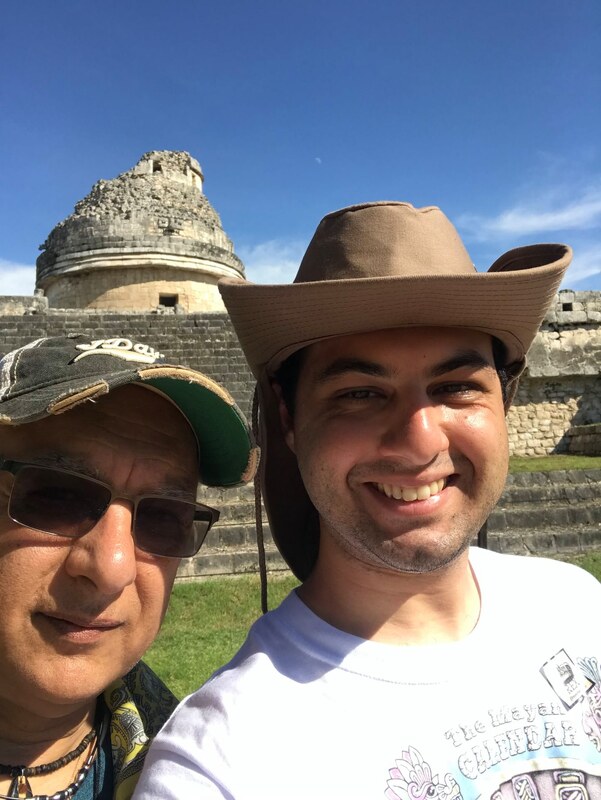
2019-10-05
Living in California, there were many local travel restrictions, and many transportation methods, stores, and restaurants were shut down to prevent the spread of COVID-19. When travel restrictions were lifted in 2023, My family and I didn’t travel, and we continued to wear masks and practice social distancing. At the same time, I would daydream about traveling to many places. One place in particular that I have yet to revisit is the ancient Mayan city of Chichén Itzá, located on the Yucatan Peninsula, Mexico. A few months before COVID spread globally, I had traveled to Cancun with my father just to go and see the ancient city; although I did take photos of the ruins, I wish that I had taken pictures of the placards and recorded the historical facts that tour guide was sharing with us. For my next visit to Chichén Itzá, I’ll create a note to write a journal about the people, places, and any historical facts I come across while taking videos and photos.
-
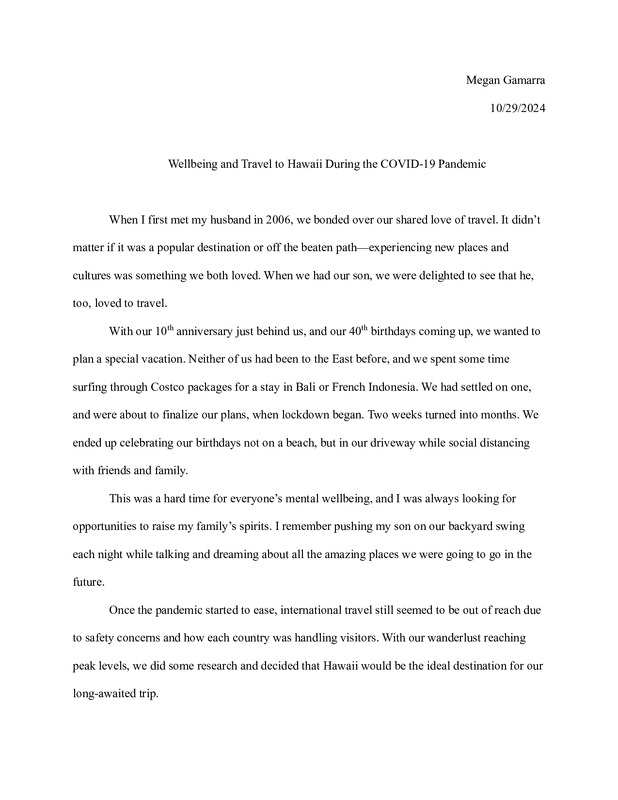
2022-03-03
tourism changes and effects on local economy
-
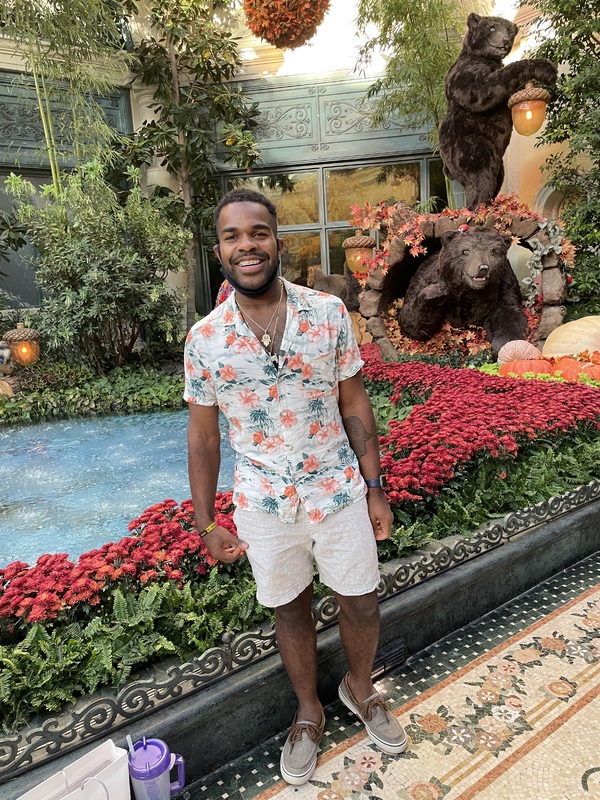
2021-11-21
This was November 2021, a time when the coronavirus was still very much an everyday threat to human lives, but also when some sense of peace and ease had returned to travel. The mask was commonplace, only to be withdrawn to take a photo or to eat, and in many cases to make a fashion statement (i.e., stocking several of different colors and varieties to match any outfit).
-
2020-08-11
During the Covid-19 pandemic, I was mostly at home. I lived in, and currently reside in Miami FL. During the earlier stages of the pandemic, everything was closed, shops, national parks, malls and the like. The only things seemingly open were liquor stores, not sure why up to this day. My first moment outside of Miami, was after the restrictions were lifted and I took, a small staycation in Fort Lauderdale. Things were still pretty uneasy, and heavy mask mandates were still in place. I stayed at a smaller hotel in North Las Olas. And we spent the day in the beach, and went around to downtown Fort Lauderdale. The city seemed to be moving as normal, and the populace was very relaxed with social distancing, and mask mandates seemed to be abided only by a few. Nowadays any remnants of Covid restrictions are few if any. About 1 year after covid officially was put down to a low extent with the use of vaccines, I traveled to New Orleans, Louisiana and I noticed a very similar ambiance as to when I was in Florida almost right after the pandemic. All of the populace was very relaxed and laid back with masks and social distancing was at an absolute 0. My guess as to why these things occurred was with the mentality of certain demographics and political narratives. Southern states generally have a more laidback outlook on life and fear the overall reductions of personal liberty, such as travel, in regards to national emergencies. Where as states such as New York and California were some of the heaviest in Covid restrictions, some even present to this day. Travel was always a beautiful thing to do for me, and Covid-19 put a small halt on it, but not completely. These stories happened between August of 2020 and June of 2021.
-
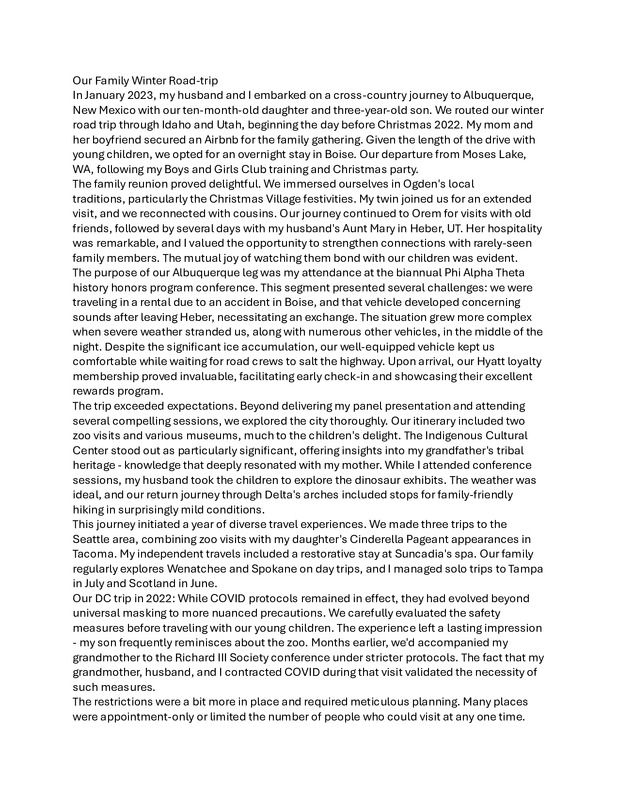
2023-01-21
Here, I share a bit about myself and my family. Though many people are still not traveling, my family and I have done quite a bit, especially with my work as a grad student, an educator, and a coach. The pandemic slowed a lot of things. And my very demanding schedule is always a factor. But with the help of family, we are able to do much more than expected.
-
2021-03-07
I remember when then Covid-19 pandemic first started, I was working at my current suit store, and we did not know what was going to happen at first. I did not travel anywhere, as at this point the global travel market was almost completely shutdown. There was discussion between the managers as to whether we would close the store and wait this out until government officials set the release date, or stay closed indefinitely. Eventually as more earlier information was released, we closed the store. As the pandemic spread, most of Florida as well as the rest of the country was shutdown. I spent most of my time at home. I tend to enjoy a cigar with a whiskey and/or another drink while enjoying the cigar. Eventually the whole state was shutdown and completely incapacitated. I spent the time eventually trying to remain entertained within the "Tiger King" series on Netflix, but once that was over with, I went through other modes of Coping. Eventually I went through my late Fathers Cuban cigar collection to try and have some type of enjoyment. I smoked close to all of his Cuban cigar collection, which in case of misinformation, Cuban cigars in the USA are impossible to obtain by retail standards, otherwise my grandfathering them in pre-personal consumption ban. I smoked close to 90% of my late fathers Cuban cigar collection, something which I didn't want to do other than celebratory or personal reasons. Covid-19 was most definitely not a reason. Therefore with the smoking also came the drinking and drank almost every bottle of anything, within the 5 month period in the state of Florida for the outright shutdown. I think eventually after a long lookback into the vices that were involved in being so isolated, the vices reign supreme when human beings do not have each other. Which speaks to the point that throughout history we, as humans, are extremely social beings. Isolation does not work well for long term, and state sponsored isolations.
I think that if i were to travel, given the chance, I would not have traveled anywhere being so close to the genesis of the disease. Not in terms of China, but being so close and available to the disease without further info, would have been disastrous for my family. If I would have gone to any country would have been either to Israel or Rome, Italy, more specifically the Vatican. I believe my faith is primary to life, and either the homeland of the Christ or the home of the church during those times would have helped me spiritually, and physically, in tremendous ways. I probably would have documented my trip via my own phone camera or Instagram in whoever was viewing at the time. I would have definitely been sure to have gone to see St. Peters Square, The Sistine Chapel, and other sites in the Vatican City. Other than that the Israeli areas would be the supposed areas where Christ walked and spoke. Such as Golgotha, Garden of Gethsemane, and the Church of the Holy Sepulchre.
These places during the pandemic, assuming they were open, were locations at the top of my list.
Date: These thoughts and events happened on March 19-20 of 2021.
Location: These memories and forethoughts would have taken place at the same time.
-
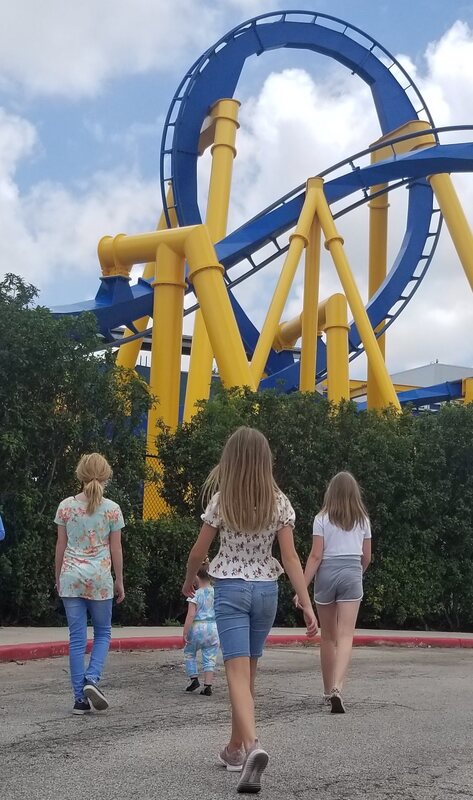
2021-07-16
We didn't know anyone in Texas, but we knew a few people from there, and they were nice. We didn't know anything about San Antonio except that the Alamo was there (we remembered that), and the internet said it had a Six Flags. We had no reason to go anywhere, except that it was July of 2021 and I had just finished what I could only hope would be the most difficult year of my teaching career (turns out it was). We had a tax return in the bank and a fire in our eyes. It was go time. We didn't have to fly there. It cost a lot more, and neither my wife nor I had ever flown in an airplane as children. But then again, we hadn't endured a Pandemic as children either; so we flew.
How did this random trip turn out? Magical. The hotel was expensive, but my daughters loved the pool. The Alamo was full of historical paradoxes, which I completely geeked out on, and we all loved Six Flags. But the best moment of all happened as we walked the cobblestone streets of old San Antonio, sharing a box of chicken. We saw a man camping on the front steps of a church, and my daughters together decided to give him the rest of the chicken, since he was probably hungrier than we were. He thanked us with his words, but even more with his eyes, and my daughters learned that even 1000 miles from home, with nothing but a half-eaten box of chicken, you can make a fellow human smile. And that made the trip worth every penny. I could never ask for a better return from a tax return.
-
2020-08
Shortly after it was announced that some of the most restrictive measures in place due to the covid 19 pandemic were to be lifted, I took advantage and planned to leave town. One of my first trips was to South Lake Tahoe in August of 2020. I choose this trip because I figured it was the safest option since I would mostly be outdoors and could stay away from people as much as possible. I was also desperate to be outdoors after being stuck at home with family. The trip went without a hitch and got the rest and release I needed. Along the way however, I did notice several changes because of the ongoing pandemic. Thankfully the areas we visited were mostly to ourselves as there was hardly anyone. Still the people we did encounter seemed almost as relieved as us; I'm not sure if it was because they were also in the great outdoors or if they were just happy to see another person who was also just wanting to be out in nature. Still, mostly everyone maintained more than sufficient distance from one another. Restaurants still offered reduced capacity and keep guests distanced. Although some businesses and locations did not require masks anymore, many still wore them (including myself). I observed mothers wiping their children's hands. Fathers carrying extra masks. Hand sanitizer was still hard to find (thankfully I had some). Occasionally there would be that person who defiantly denied a mask or just didn't wear one when everyone else. Many people would stare at this person. I would personally get nervous around groups who were particularly loud or in large groups, although I must admit I've always been a bit socially anxious. It was just that now I was not only uncomfortable with unfamiliar groups of people, I also wondered if they were sick, or if they ever were, and did they even care. I thought these things as I watched spit fall from people laughing or eating. I paid special attention to employees and staff at restaurants and establishments. Would they wipe the spit off the counter? Did they wipe down the tables? I was especially hyper vigilant and felt guilty. I was traveling during a deadly pandemic with my family still back at home. Thankfully, I didn't get sick. That didn't happen until after I was called back to work since I was deemed an "essential worker." Then I would become ill for about 4 torturous months.
-
2020-05-23
Although I have taken longer trips to New Orleans, Costa Rica, Boston, and Mexico since COVID-19 travel restrictions were lifted, I consider the local afternoon stroll through the local San Antonio Japanese Tea Garden to be the first real COVID trip. It was May of 2020 , and, at that point, the most of outside I had experienced since late March of 2020 was sitting in my backyard or making hasty trips to the grocery store. With the weather so gorgeous and with doctors and politicians saying it was safe to go to parks so long as we kept our distance from other people, my boyfriend and I decided to venture to the Japanese Tea Garden for a stroll and a picnic in the park, just outside of the gardens. Unbeknownst to us, this was a very popular idea; we arrived to the gardens to find it swarmed with other people hoping to get some fresh air. The Japanese Tea Garden can be tricky to navigate with an abundance of people around; it consists of narrow pathways, bridges, and stone staircases surrounding large ponds, streams, and waterfalls, so we found ourselves having to squeeze past people, only inches away from them. What was worse, we neglected to bring masks, thinking we'd be far away from park-goers. Not having my mask made me feel incredibly anxious. We cut our walk through the gardens short and continued with our picnic in the larger park, safely away from the crowds. I felt like I could finally breathe safely. When I got home, I was very nervous that I may have come in contact with someone with COVID. This feeling persisted for a while. At the time, it was still very difficult to get tested for COVID if you were not a healthcare professional due to the scarcity of tests and testing locations in San Antonio. Additionally, our mayor, county judge, and local health advisors warned of a spike in COVID-19 cases which did not ease my tension. I essentially waited on pins and needles as I monitored myself for symptoms. While I didn't catch COVID (the first time I caught COVID was in November 2022 actually), I didn't make another venture like that for another three months due in part to the anxiety I experienced that day.
-
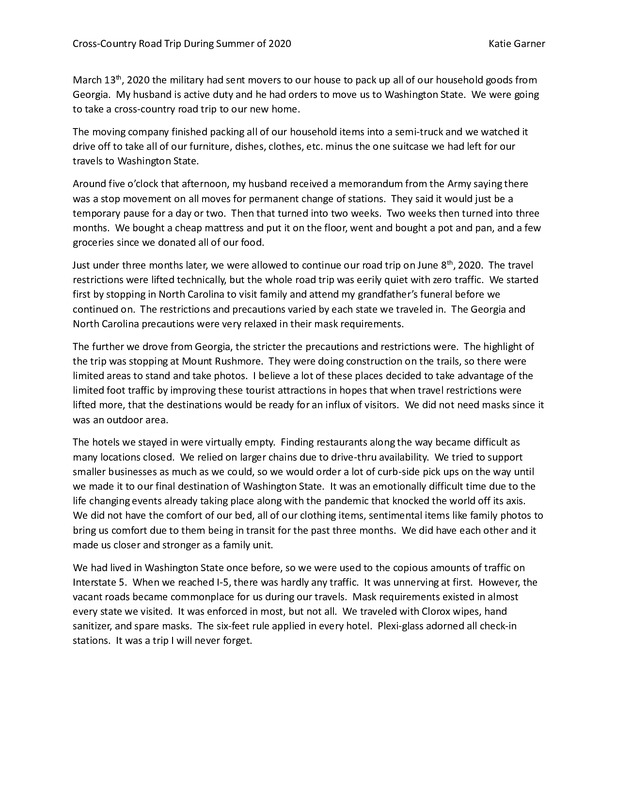
2020-06-08
This story is about my family's experience of having to move during the COVID-19 pandemic from Georgia to Washington State and the road trip that took place. It was a stressful event because we did not know much about COVID-19 at the time and how it would affect us if we did contract the virus. We did not even have typical creature comforts to comfort us.
-
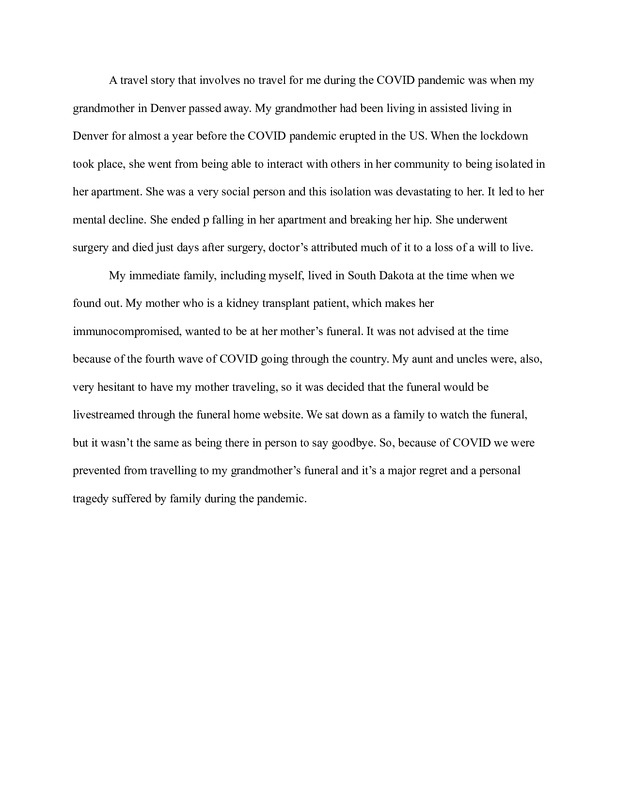
2023-07
It tells a story about how COVID prevented my family from attending my grandmother's funeral. Leaving us unable to properly say goodbye and grieve with family. It's a travel story with no travel.
-
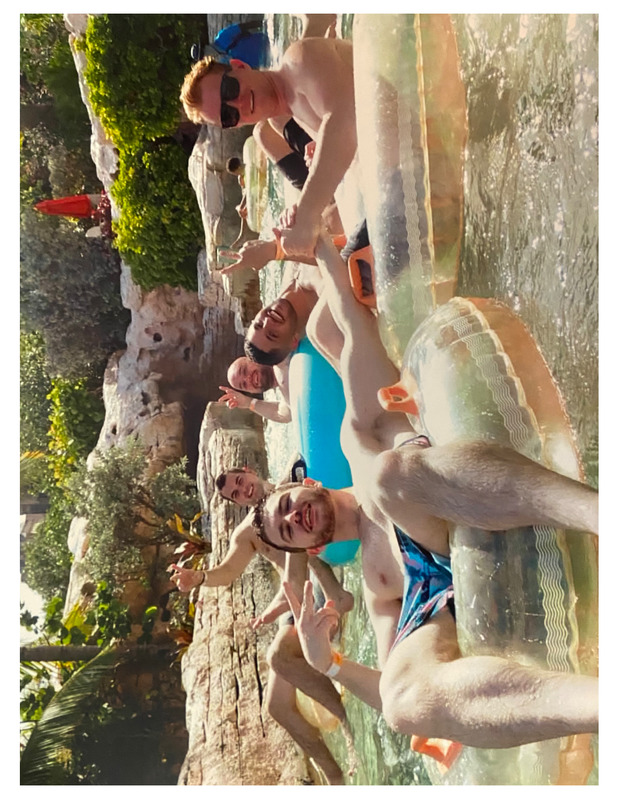
2022-05-15
My first trip in the post-covid era was to the Bahamas in May 2022. It had been years since I was last out of the country. The family of one of my close friends has a timeshare and I was invited to spend a week down there with a handful of friends. Heading into the 2022 trip, I was nervous about international travel, especially to a place I had never been before. The fact that I was with my friends made things a little more comfortable for me, but I still didn’t know what to expect or if I would even be able to make it to the Bahamas and back home. See, at the time the Bahamas still required a negative covid test to enter the country as part of their “covid visa” protocol. The country also required a negative test to leave the country. The friends I was with were very cavalier when it came to covid and covid restrictions. I was nervous, and I was and am considered high risk due to the nature of my asthma, but I was still determined to have a good time with my friends… and it ended up being one of the greatest trips I ever went on. New experiences, new food, a break from my life (which had become aggressively difficult to deal with), that trip was everything I had hoped it would be. I always kept a mask in my pocket just in case, but the nature of the negative covid test at least gave me some peace of mind that I’d be okay. The picture I included is of a smaller part of the group - 5 guys having a time on a lazy river. I remember laughing hysterically with each lap we did. That was the first time post-covid where I finally felt free and relaxed.
-
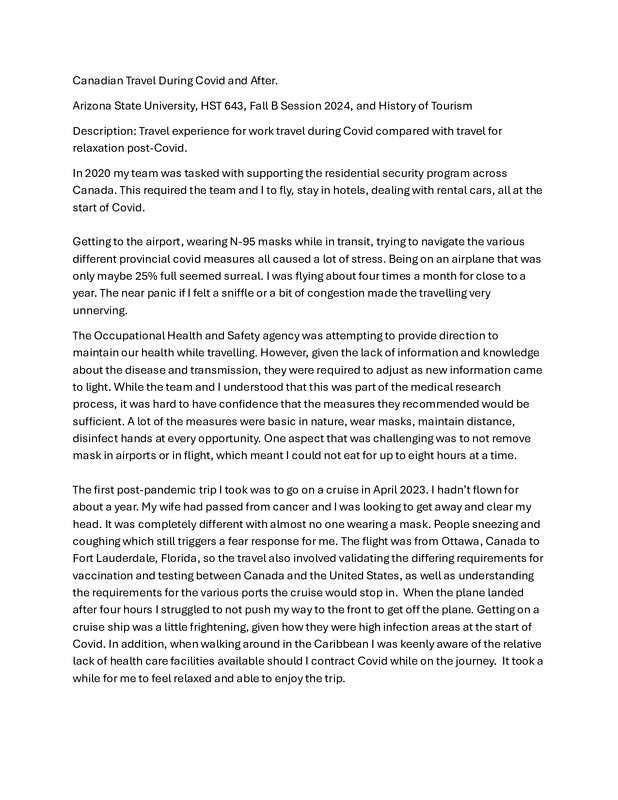
2020-03
Contrasts domestic travel during Covid to respond to security program needs versus personal travel from Canada to the United States post-pandemic, and the different airline/airport experience.
 2020-02-01
2020-02-01 2022-07-01
2022-07-01 2020-09-12
2020-09-12 2022-05-11
2022-05-11 2021-07-17
2021-07-17 2021-07-20
2021-07-20 2021
2021 2020-06-01
2020-06-01 2023-01-21
2023-01-21 2020-05-10
2020-05-10 2020-07-03
2020-07-03 2020-08-03
2020-08-03 2021-08-19
2021-08-19 2020-06
2020-06 2022-02-12
2022-02-12 2020-03-04
2020-03-04 2021-10-30
2021-10-30 2022-05-26
2022-05-26 2021-05-24
2021-05-24 2022-06-13
2022-06-13 2020-05-01
2020-05-01 2021-01-16
2021-01-16 2019-10-05
2019-10-05 2022-03-03
2022-03-03 2021-11-21
2021-11-21 2023-01-21
2023-01-21 2021-07-16
2021-07-16 2020-06-08
2020-06-08 2023-07
2023-07 2022-05-15
2022-05-15 2020-03
2020-03